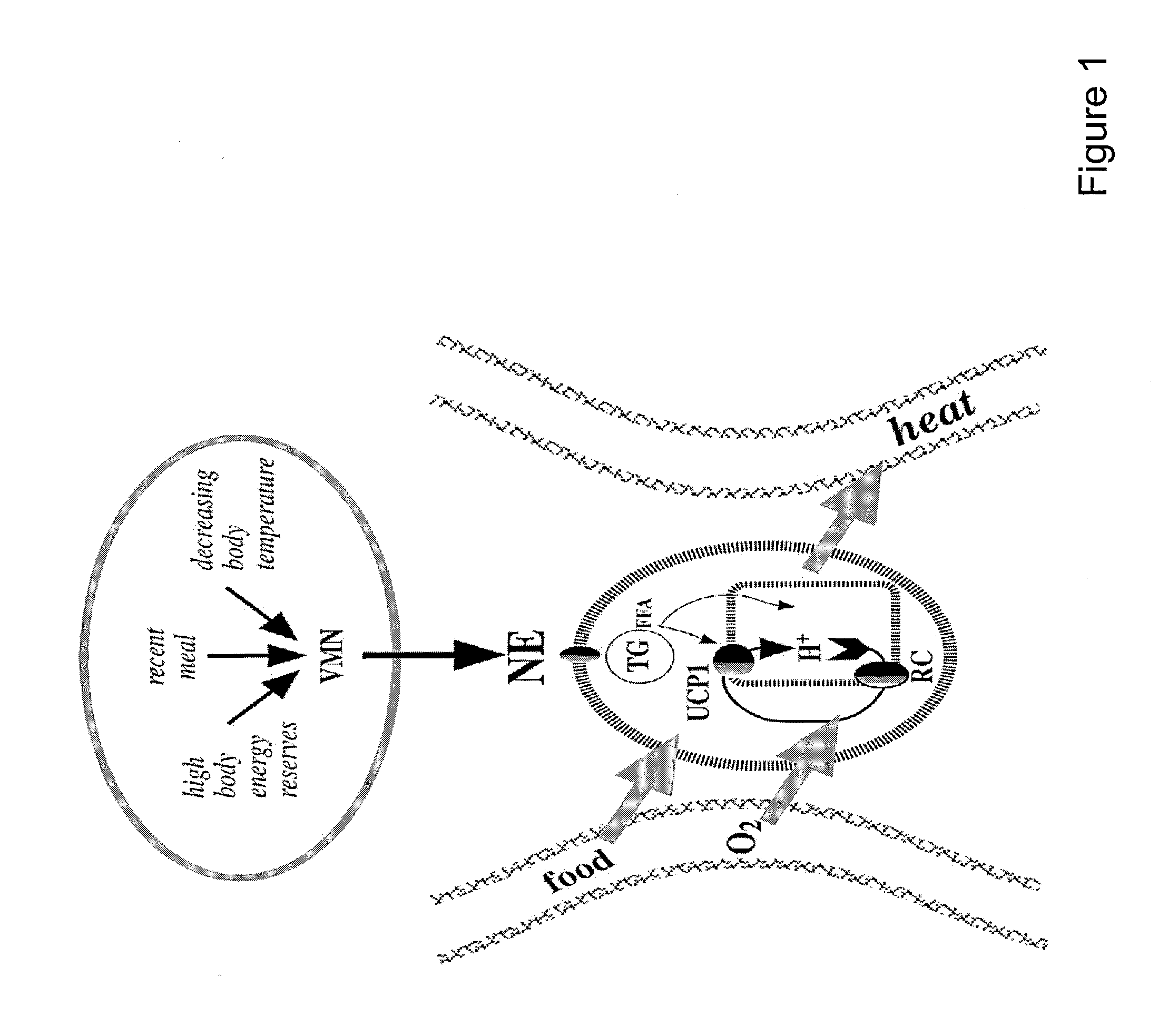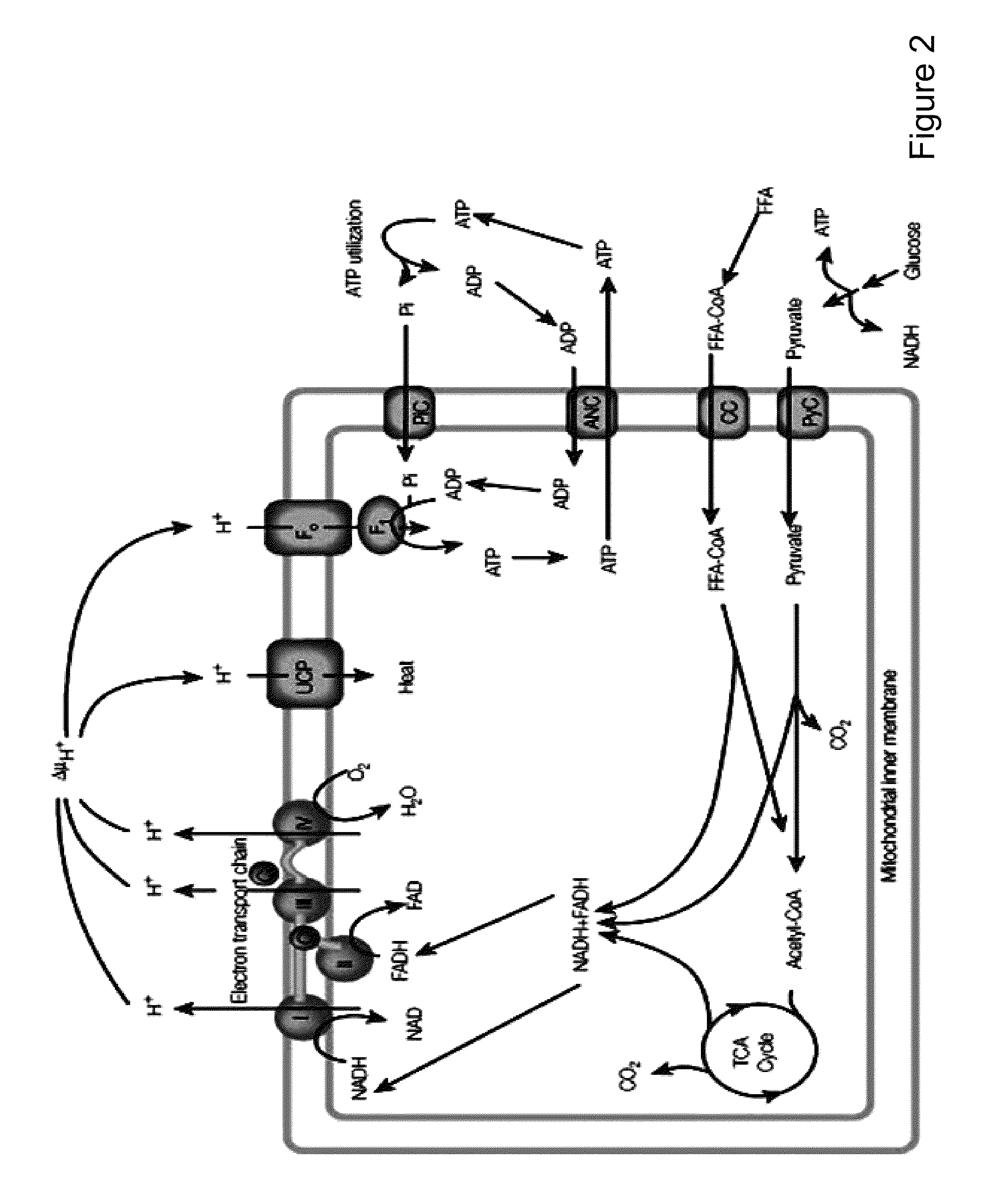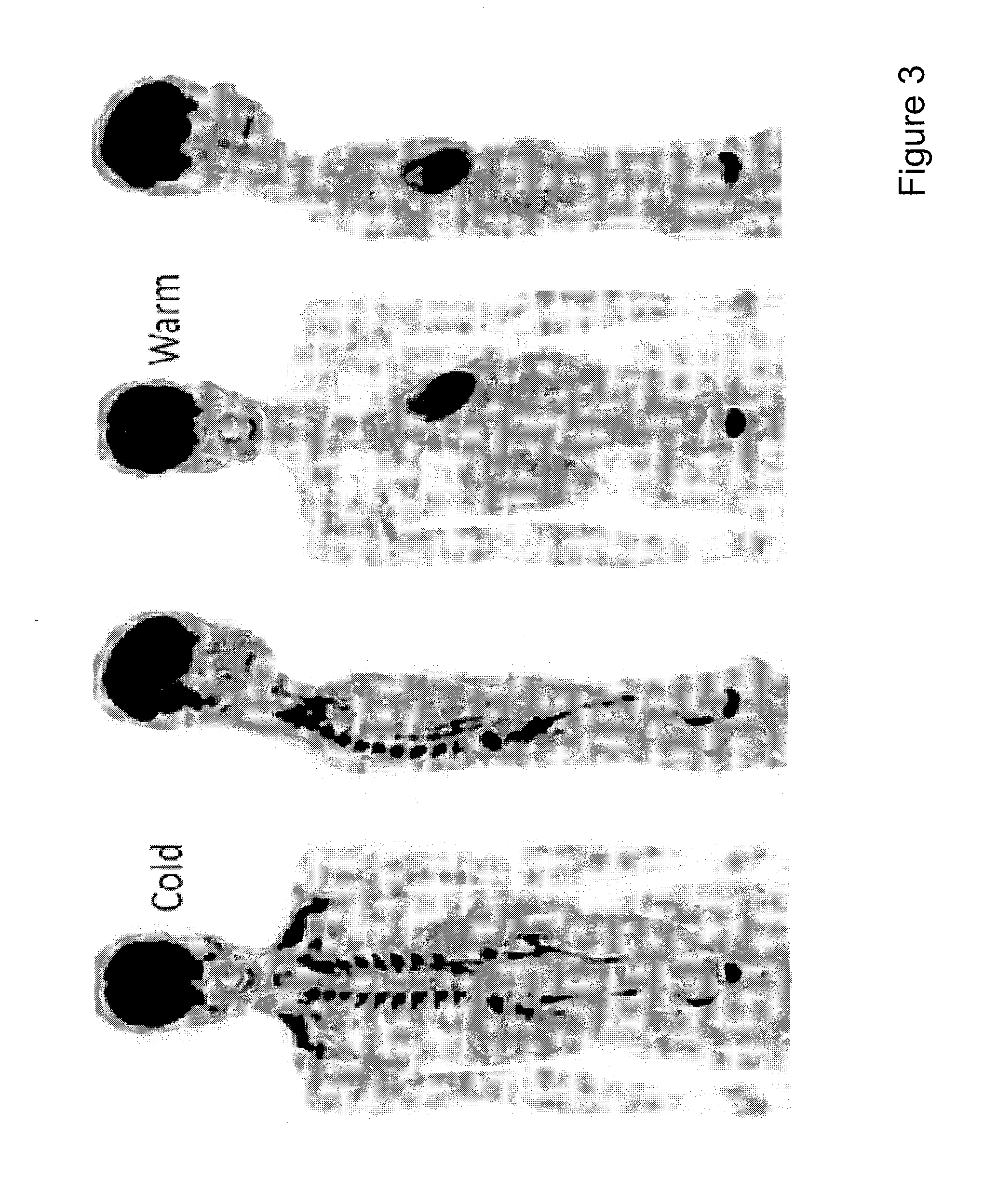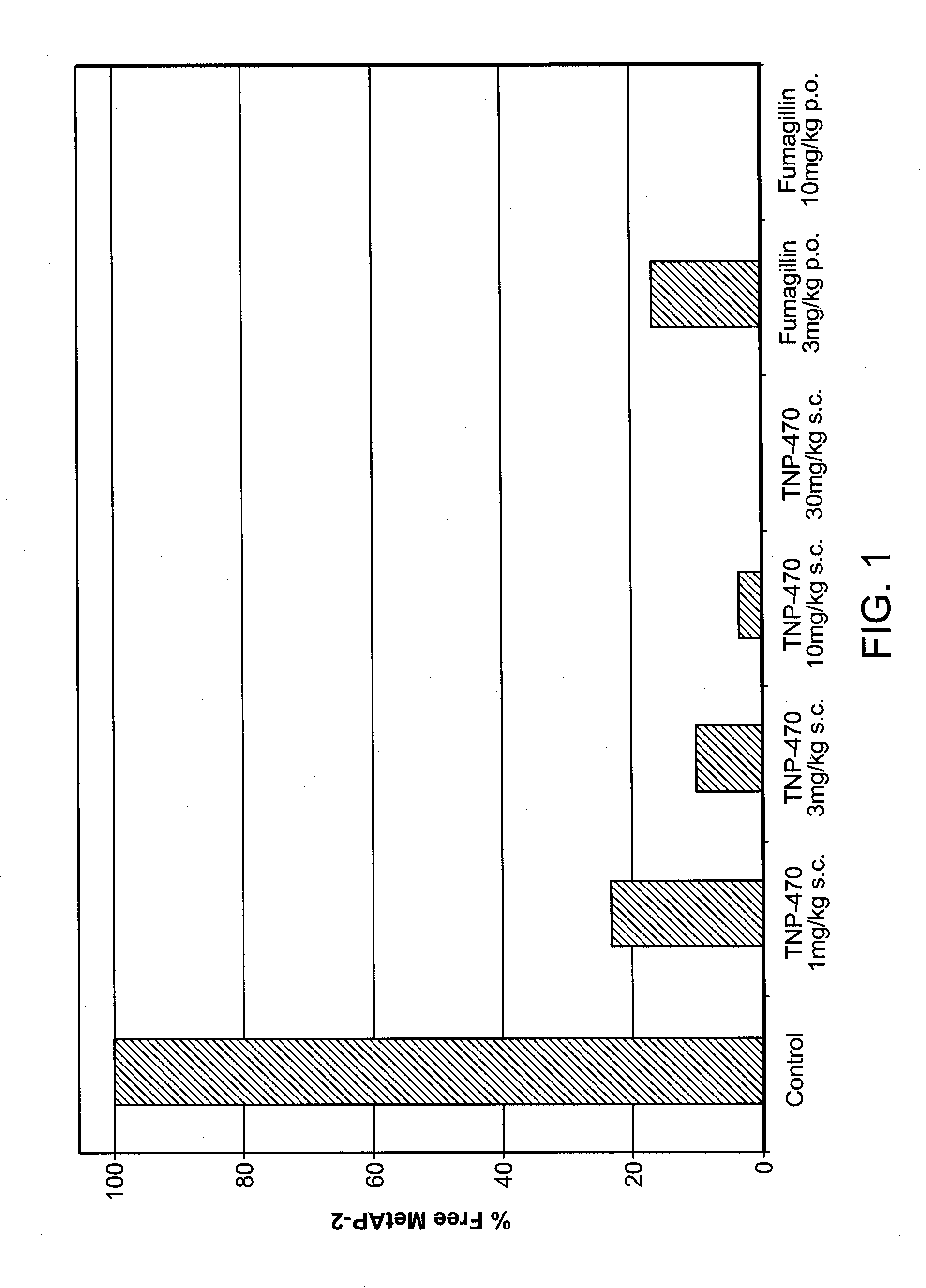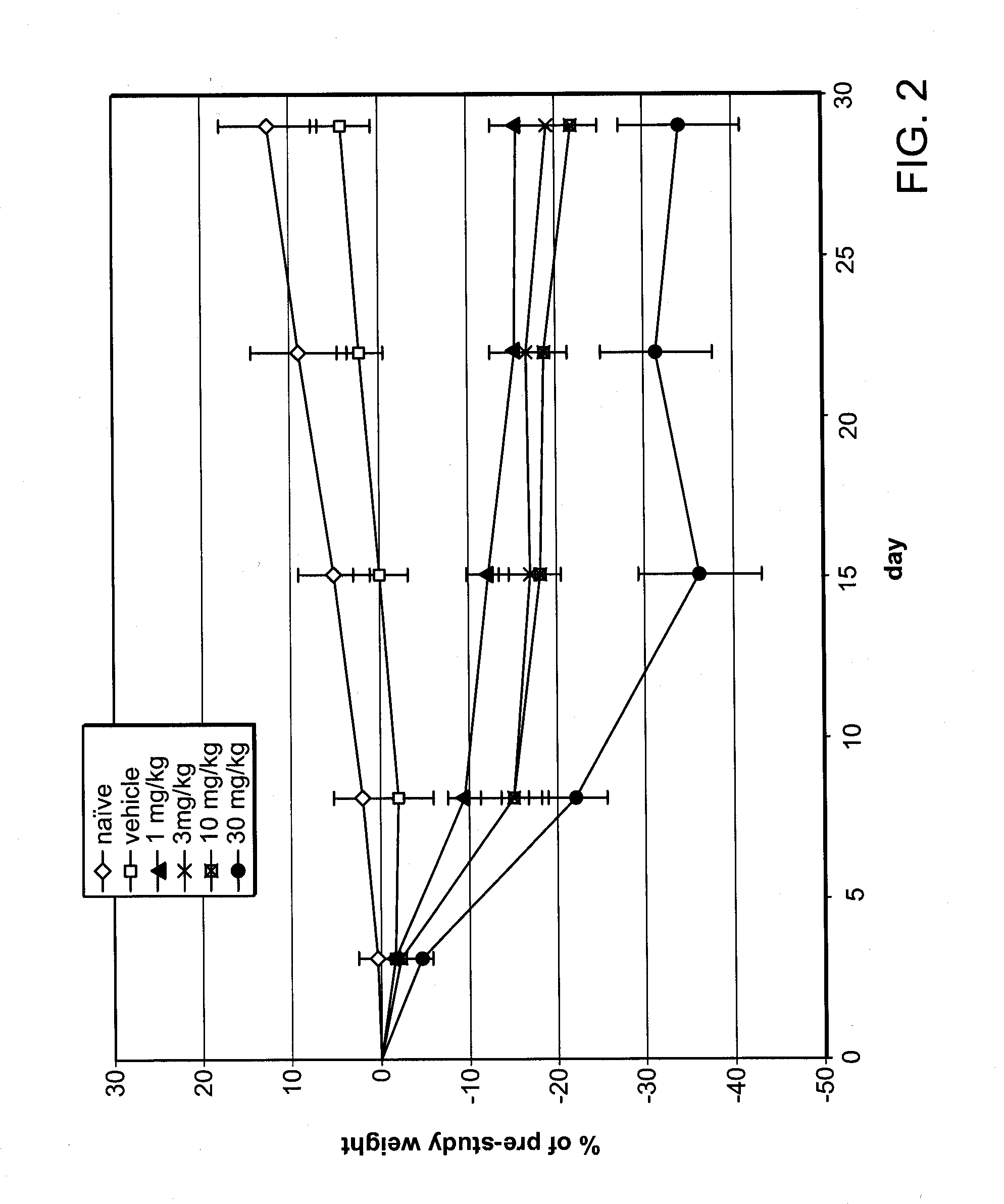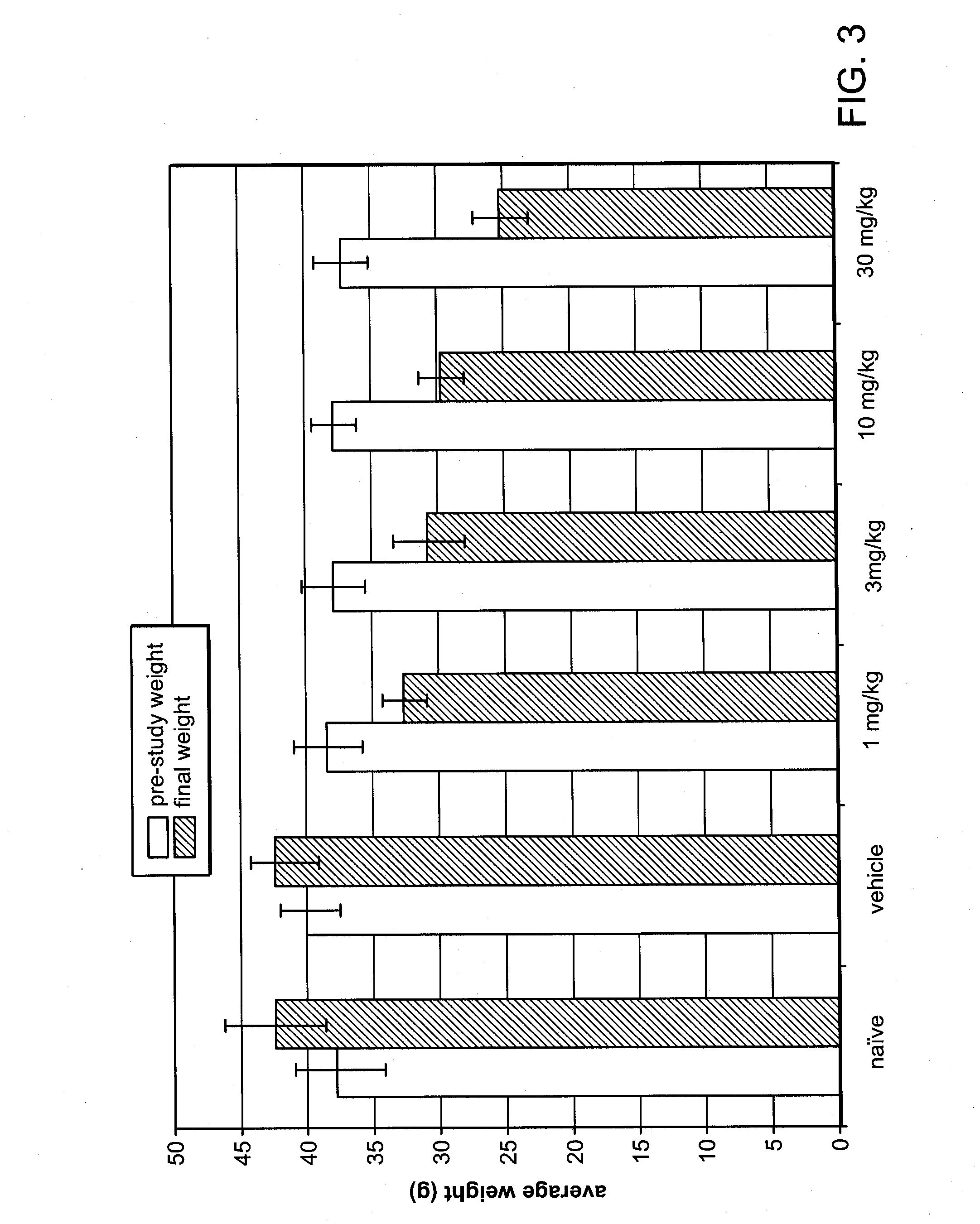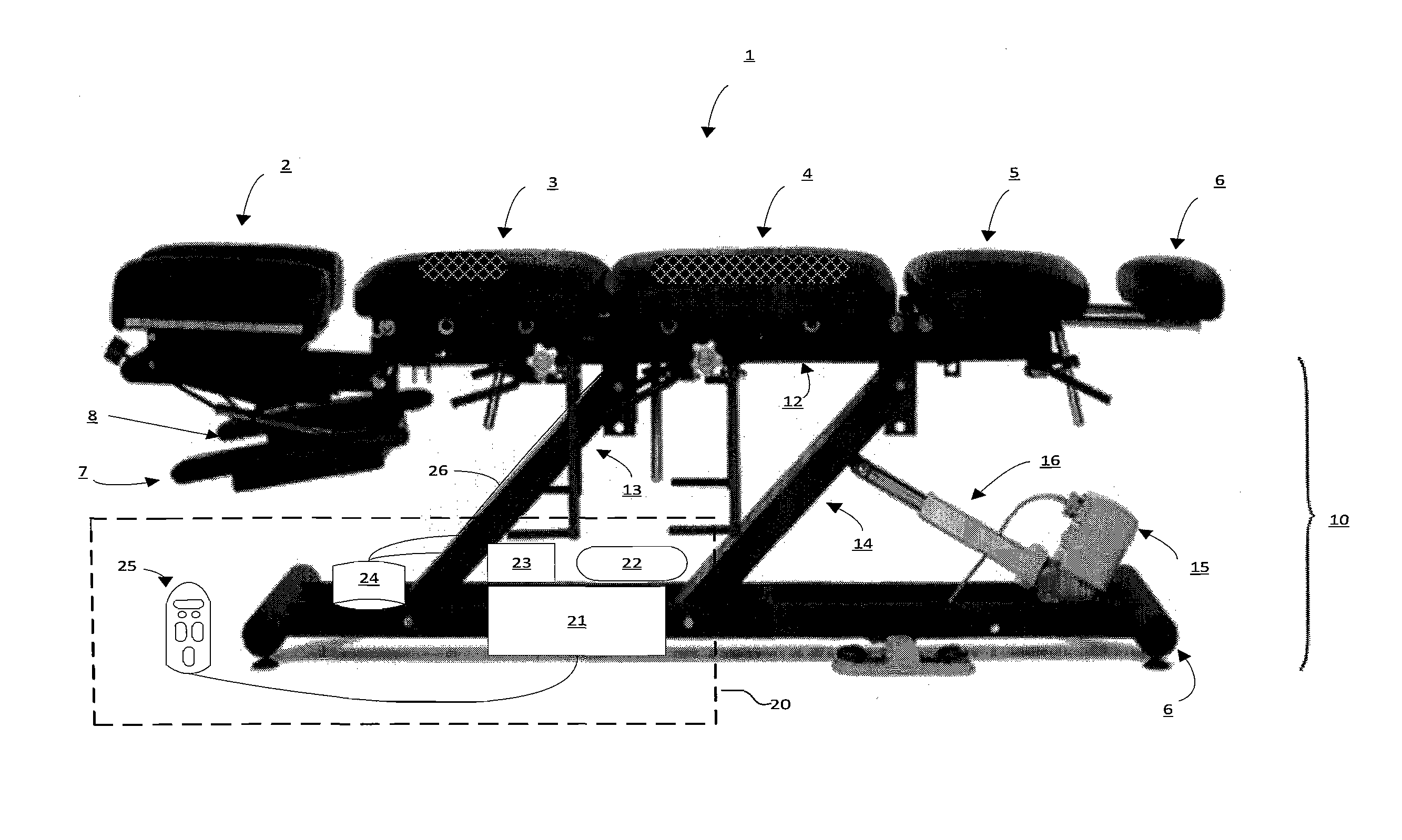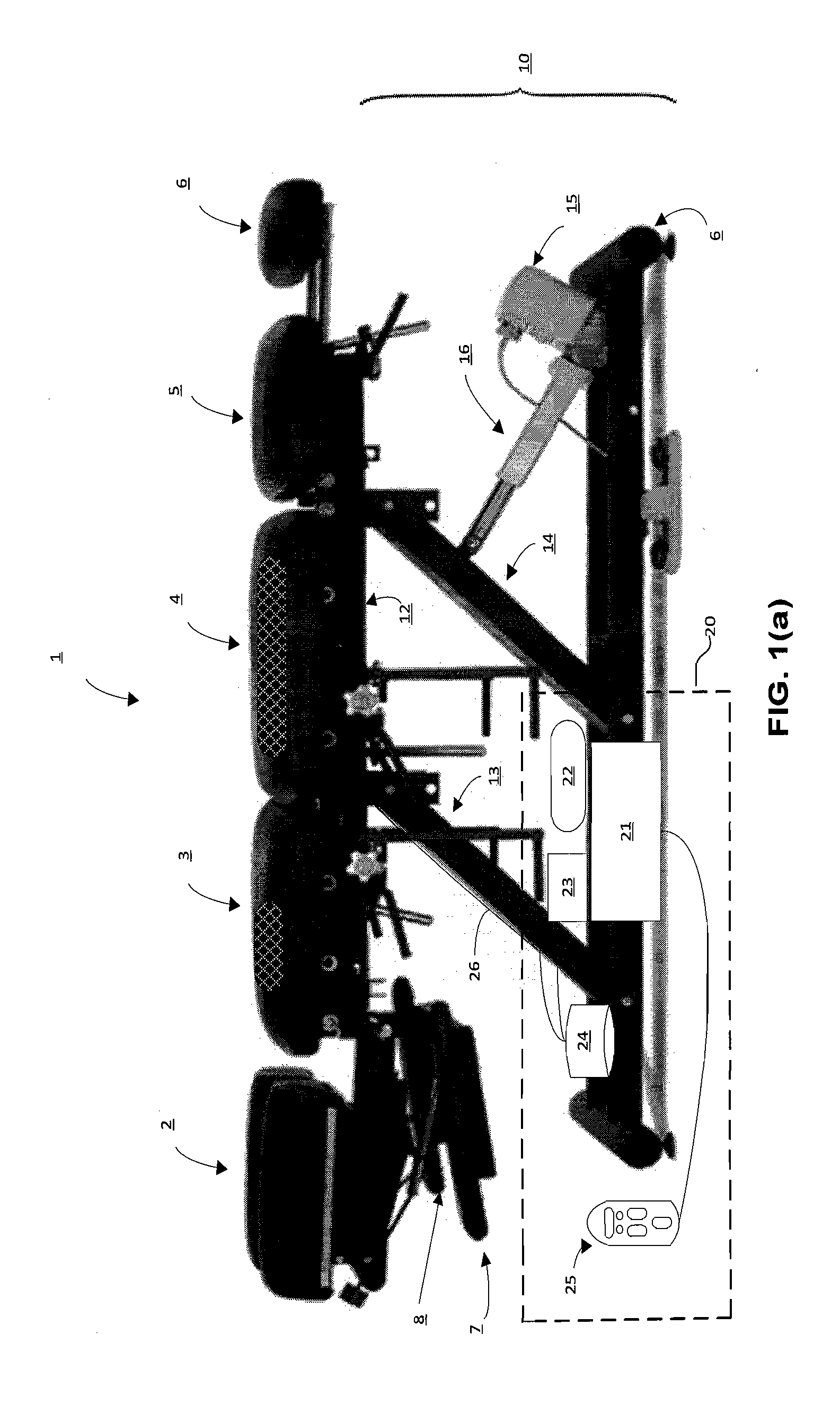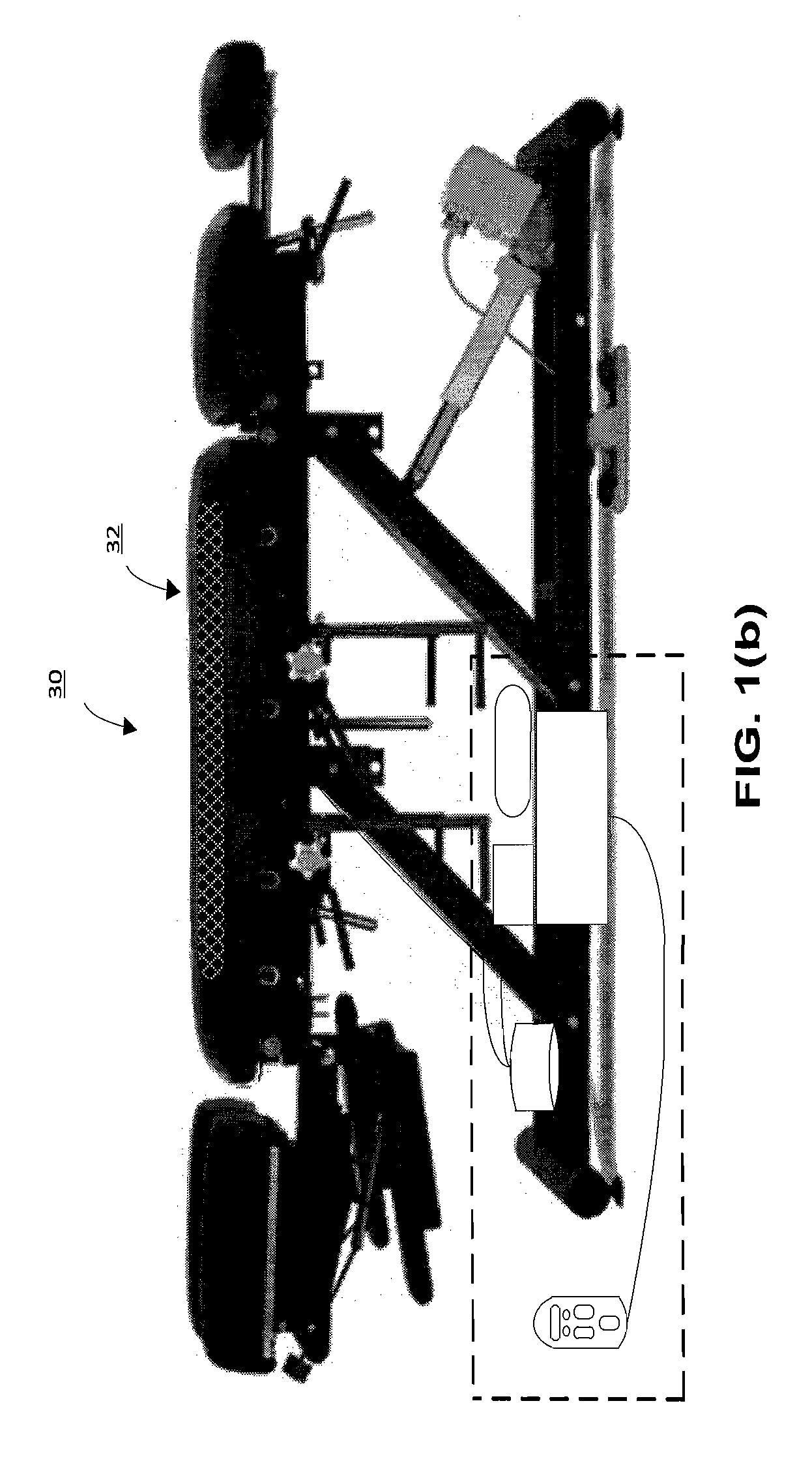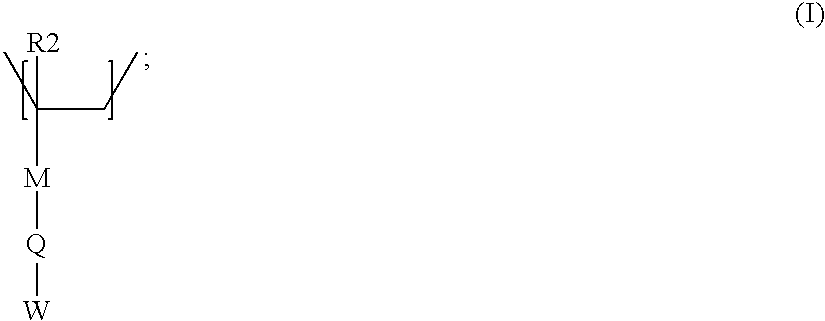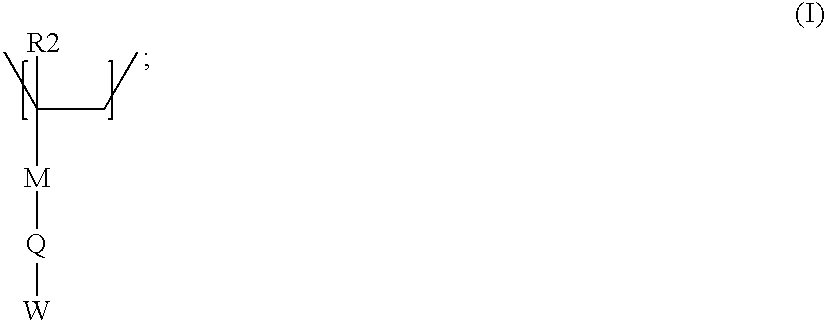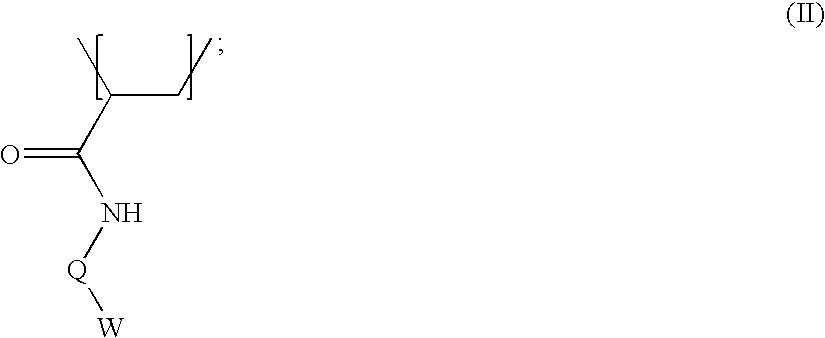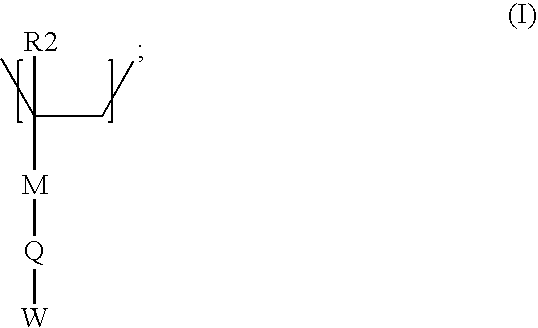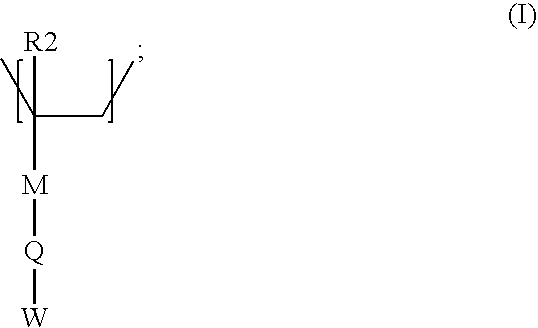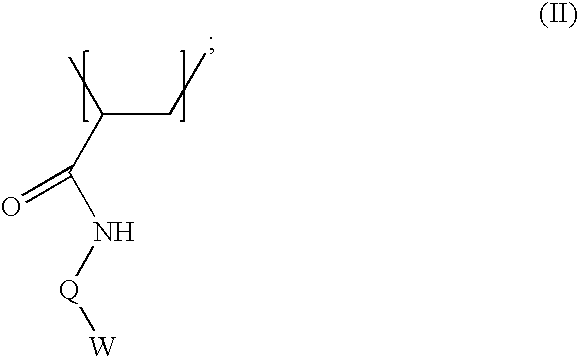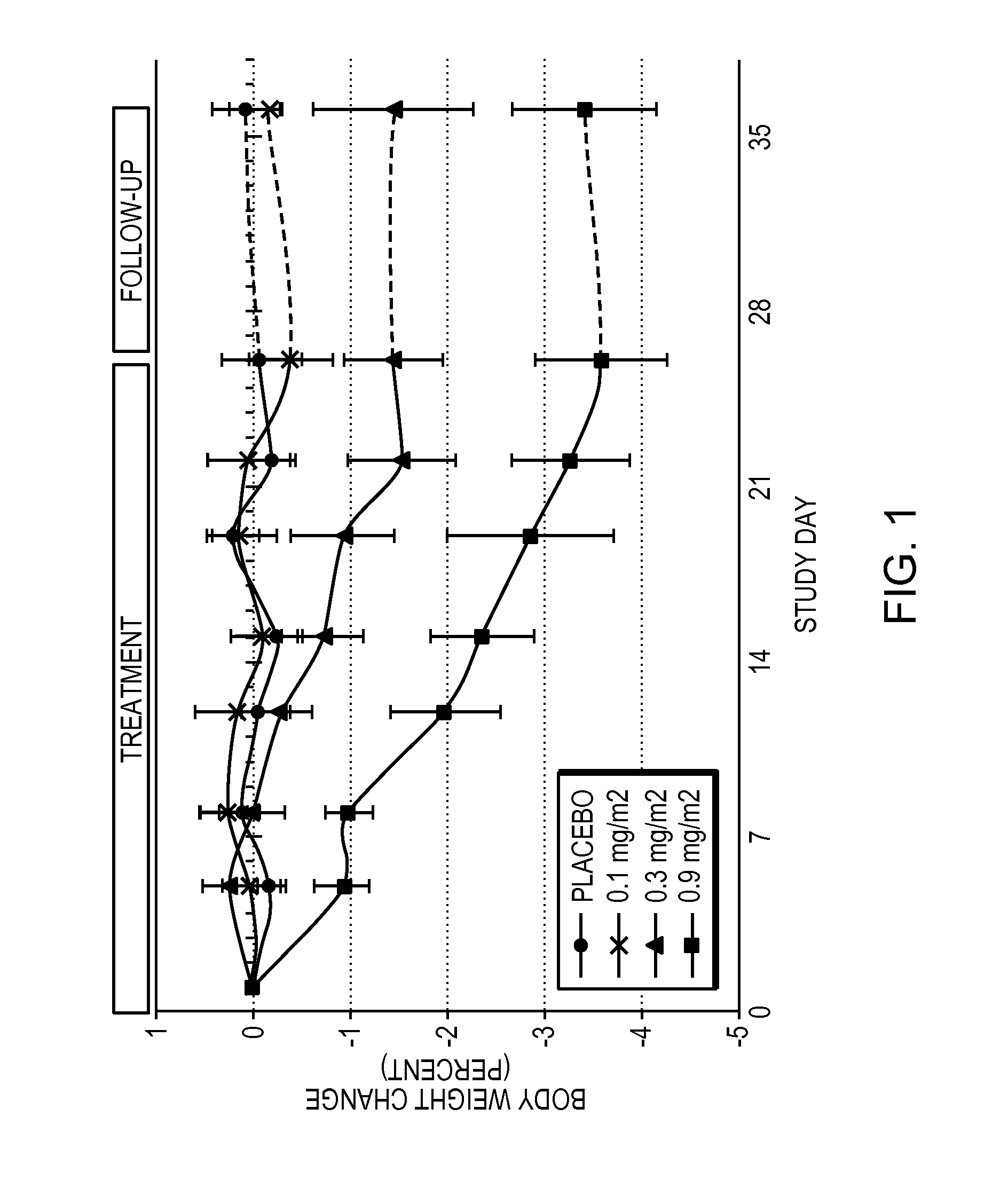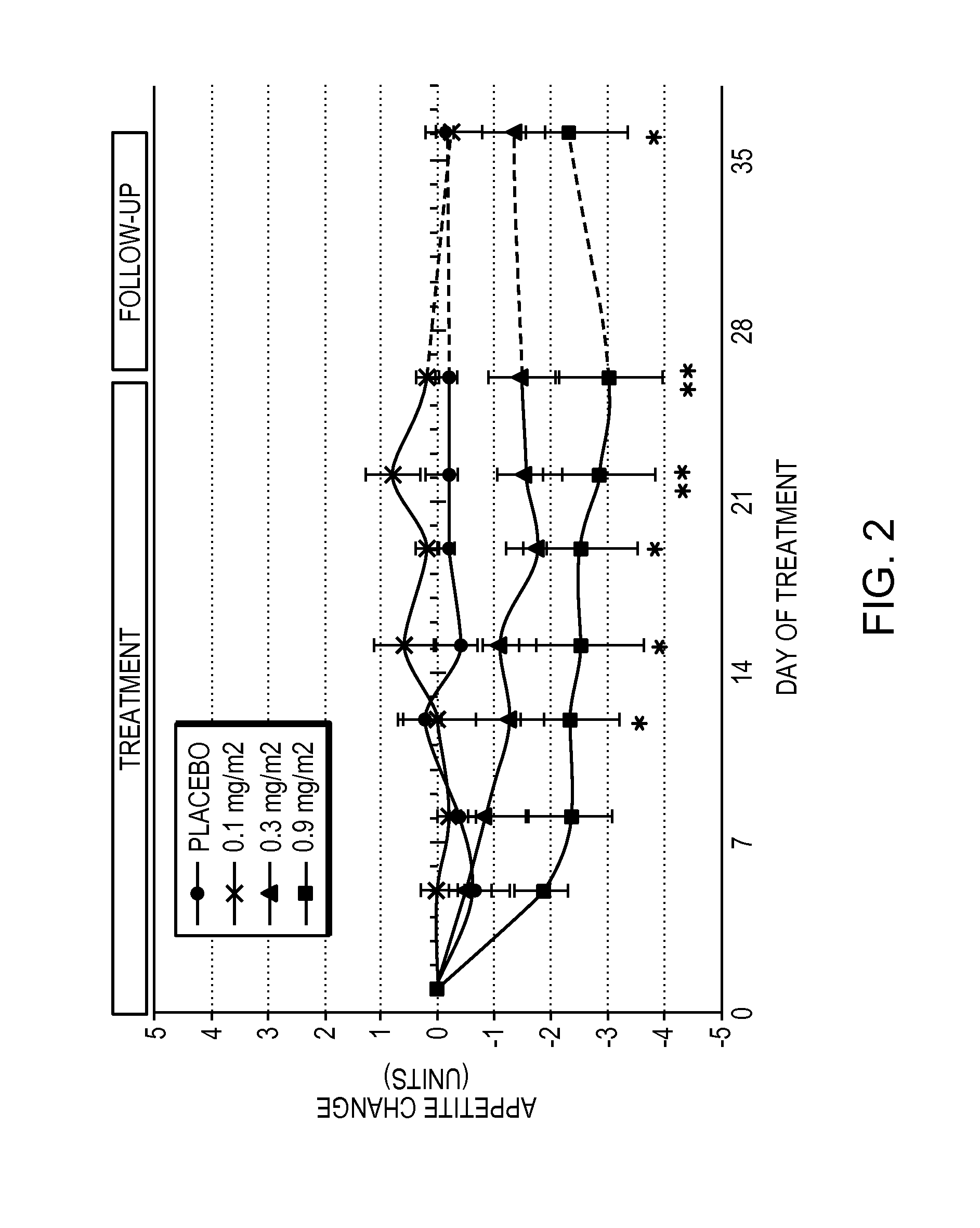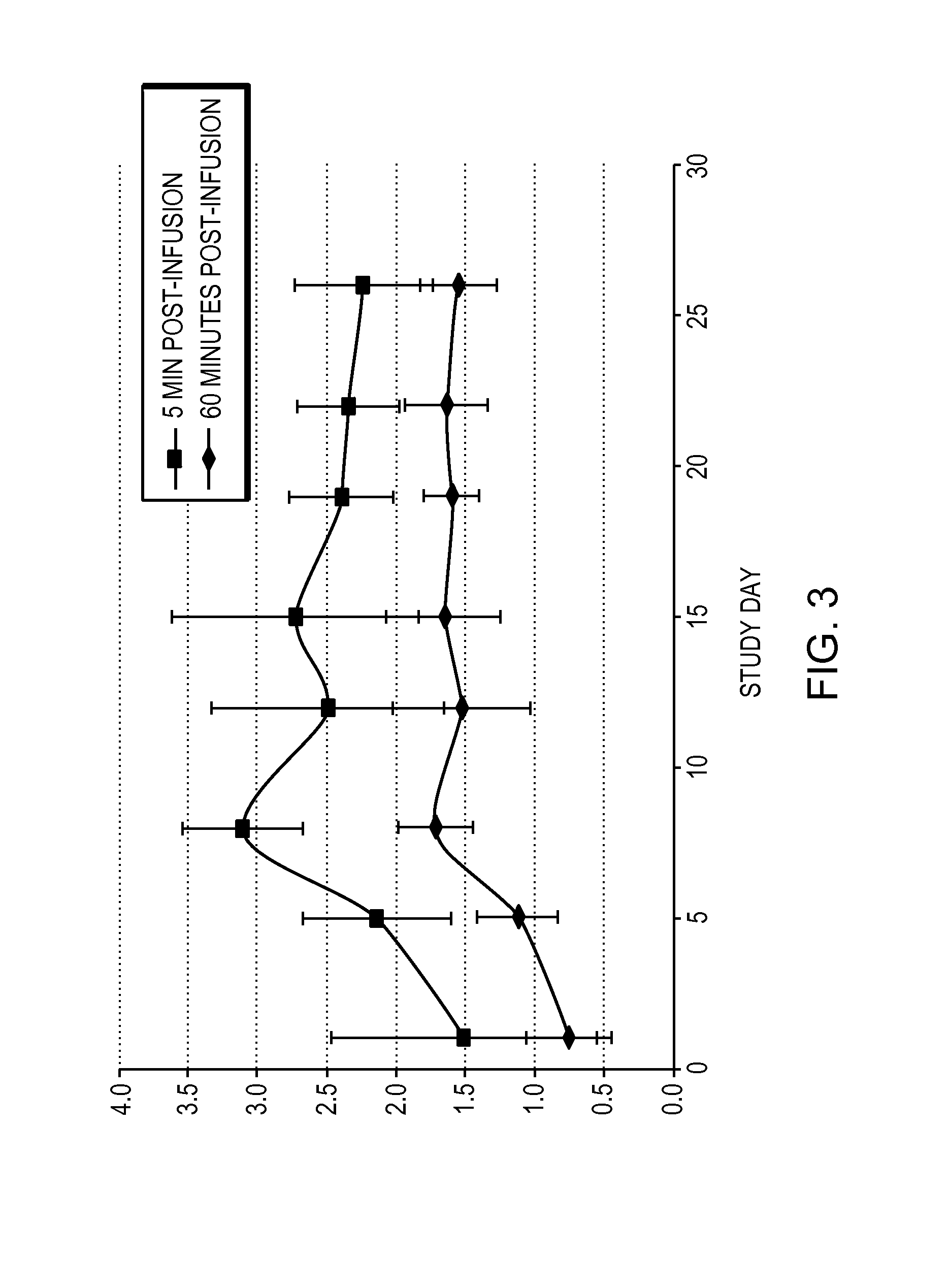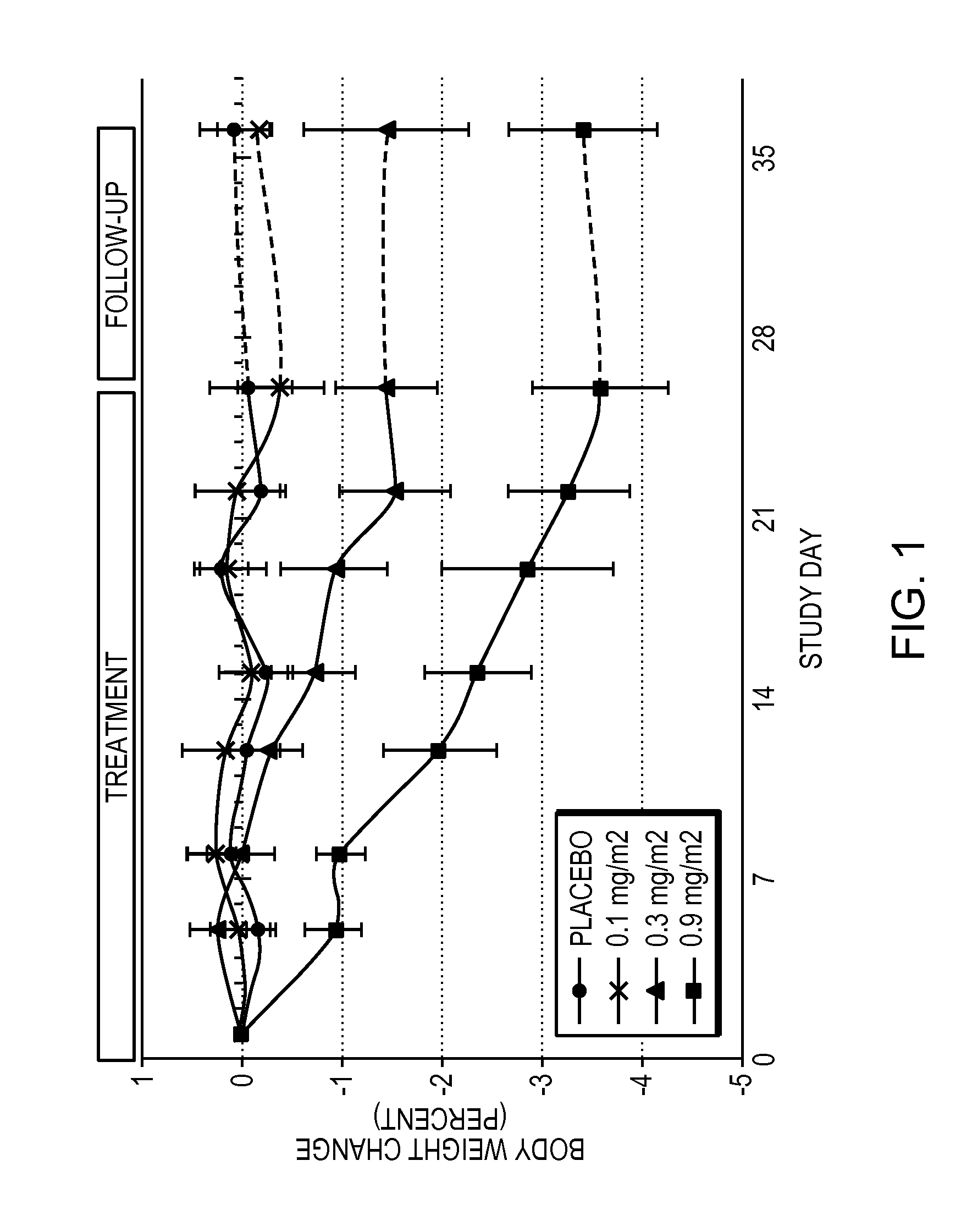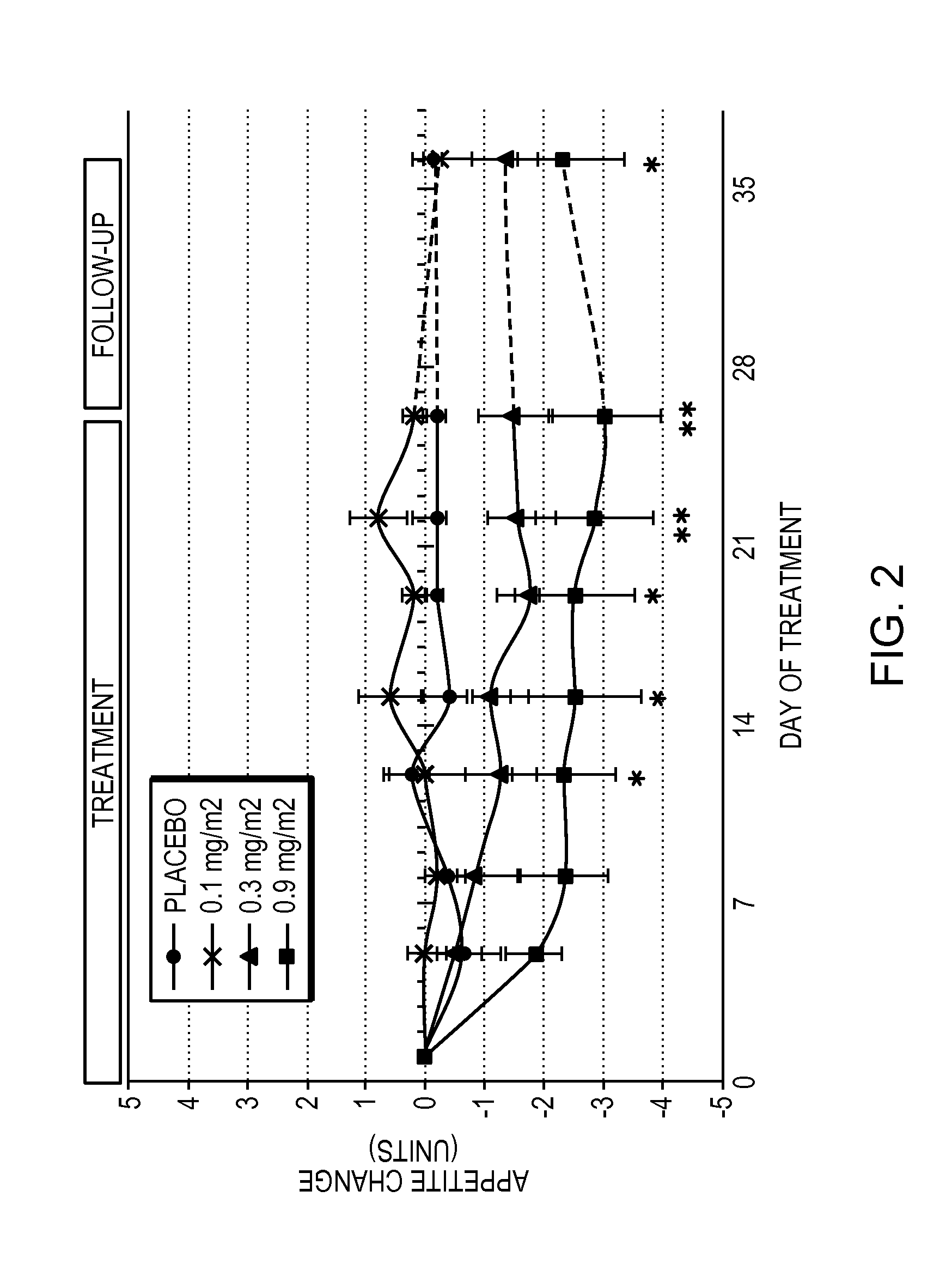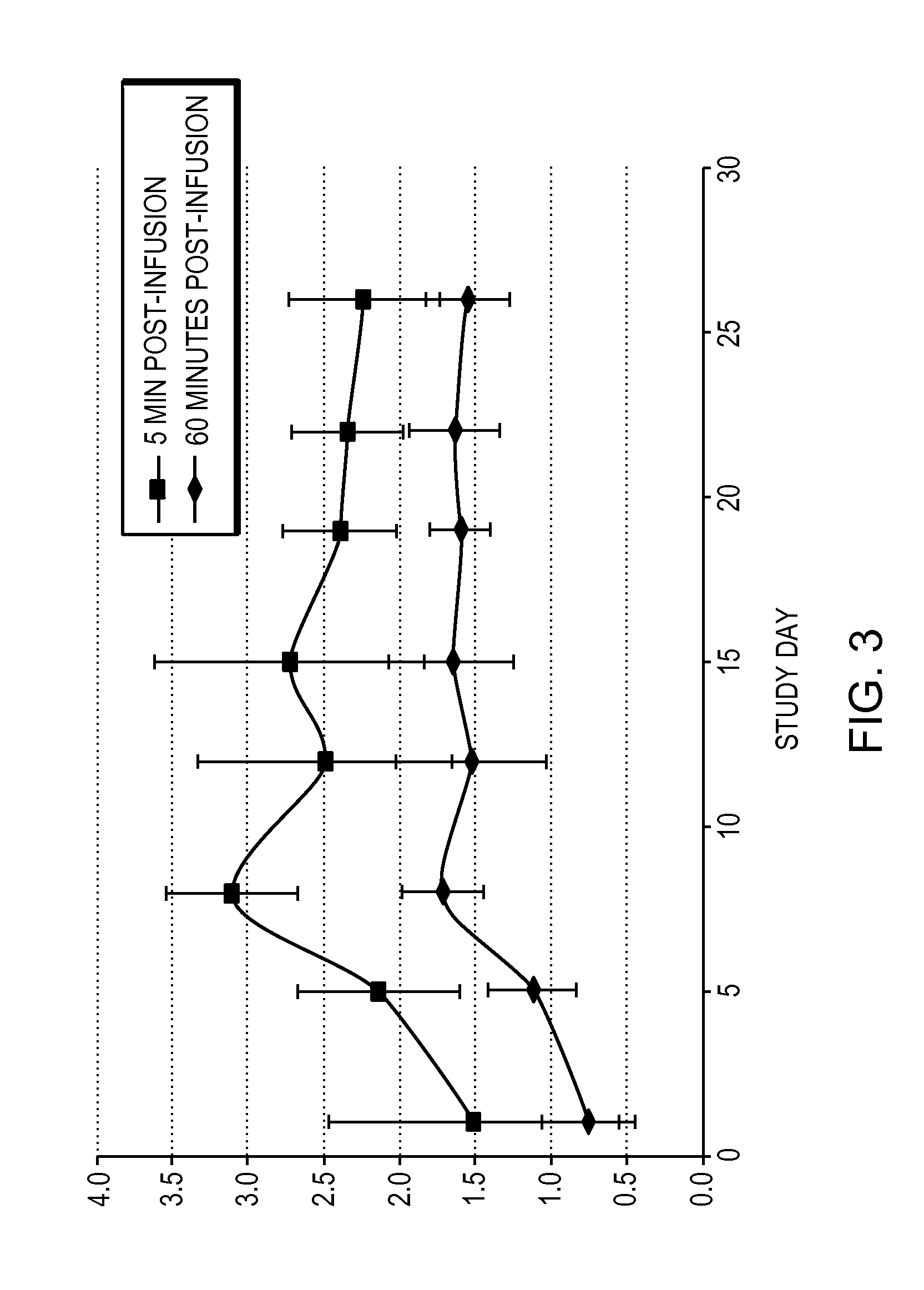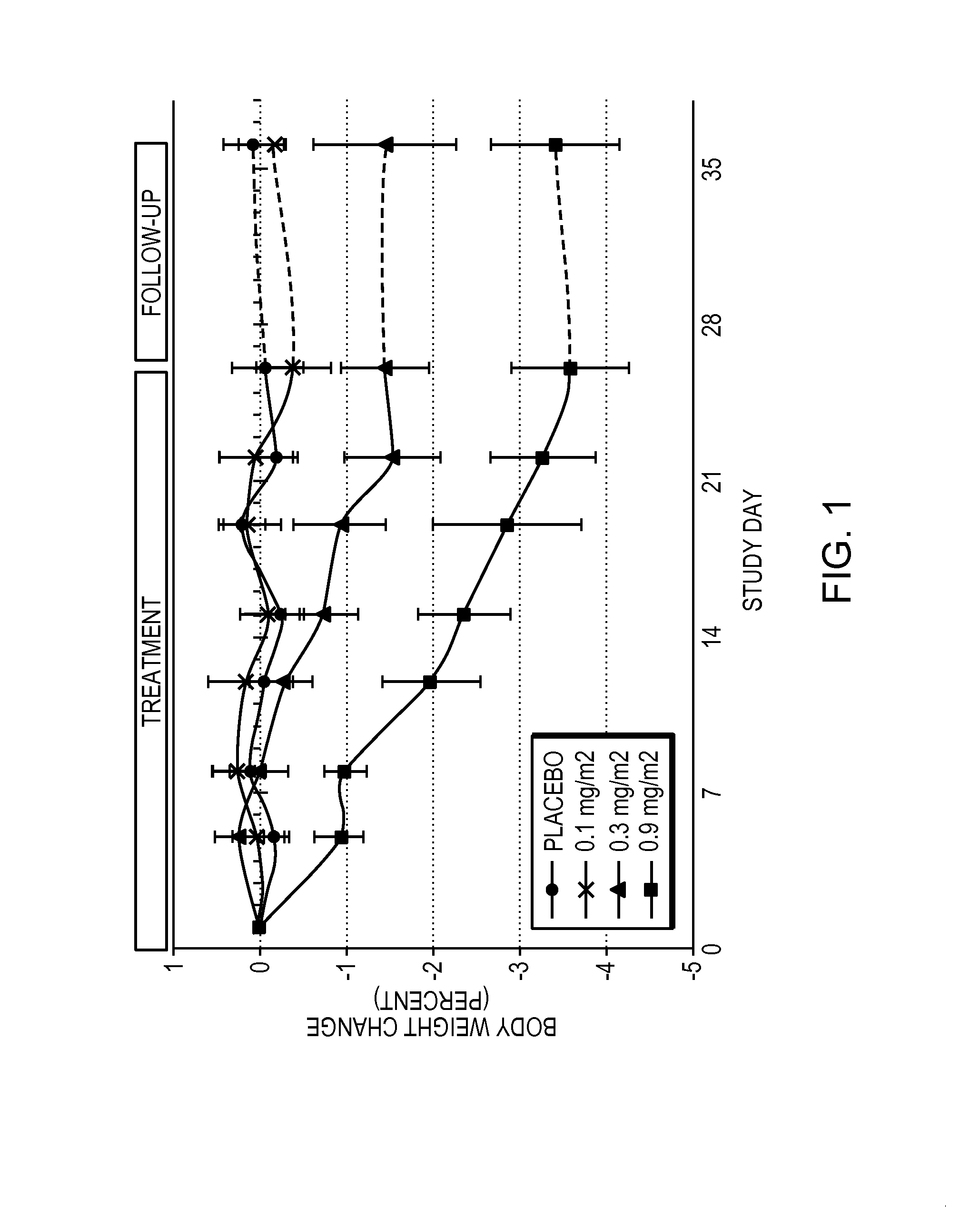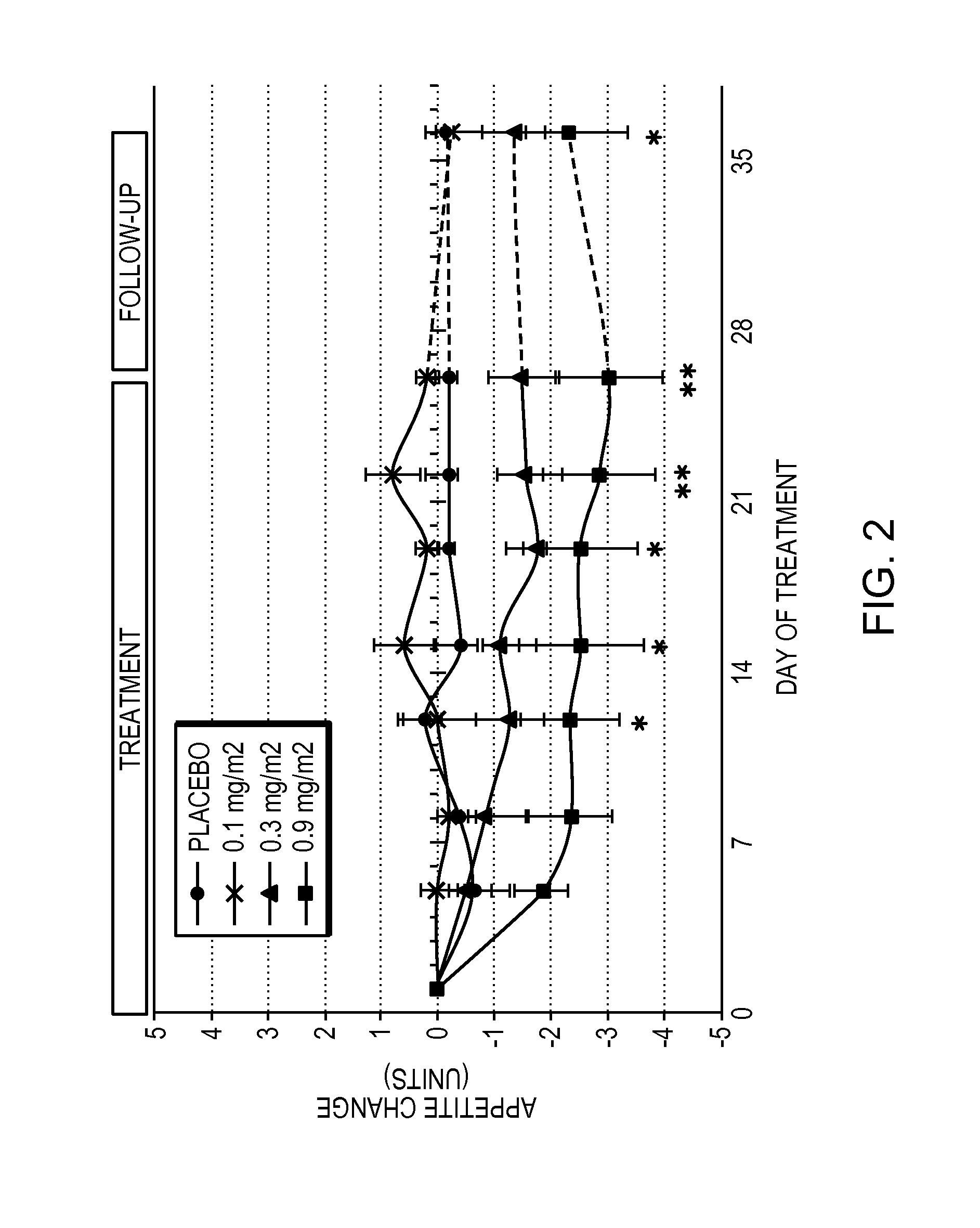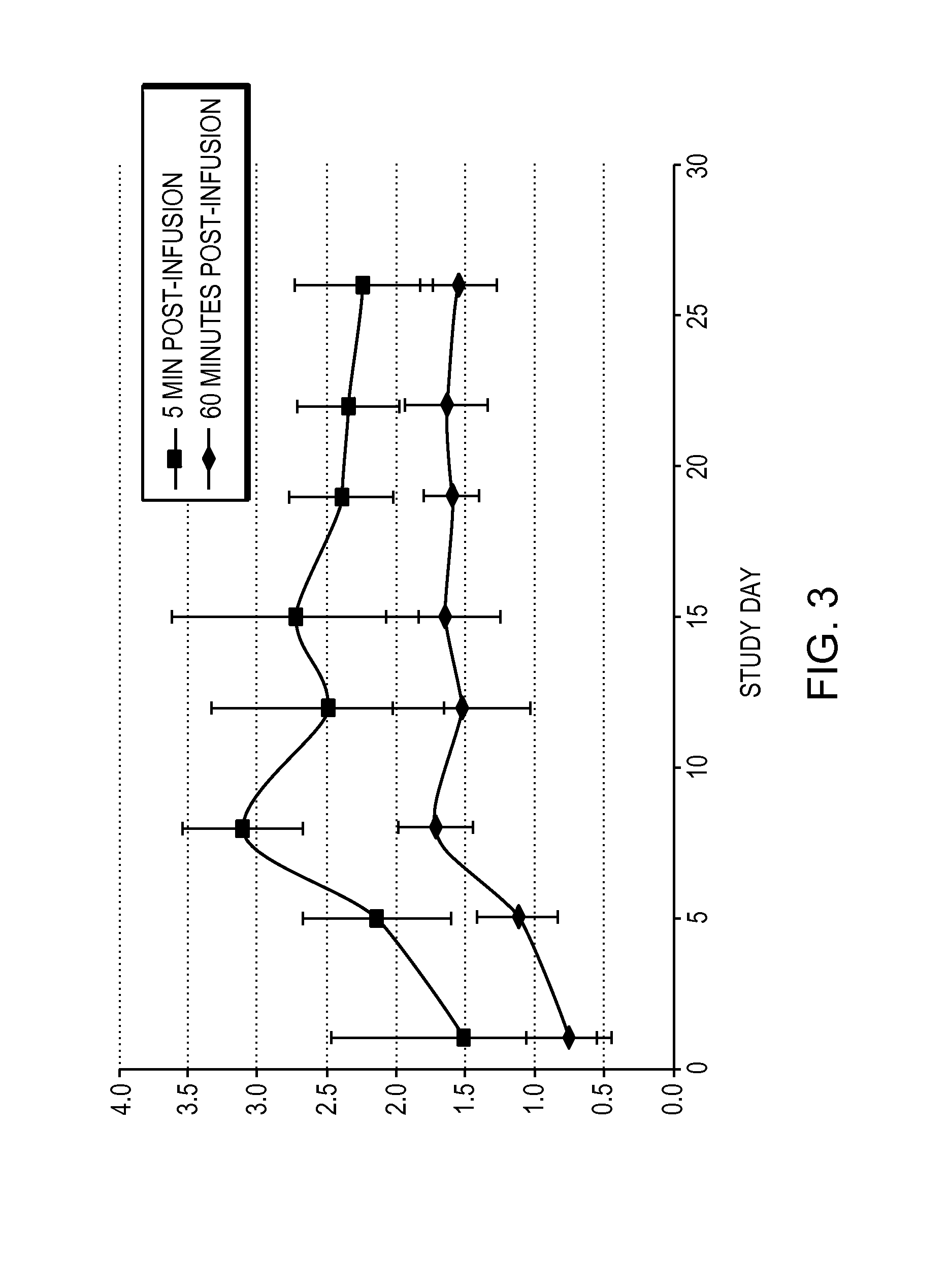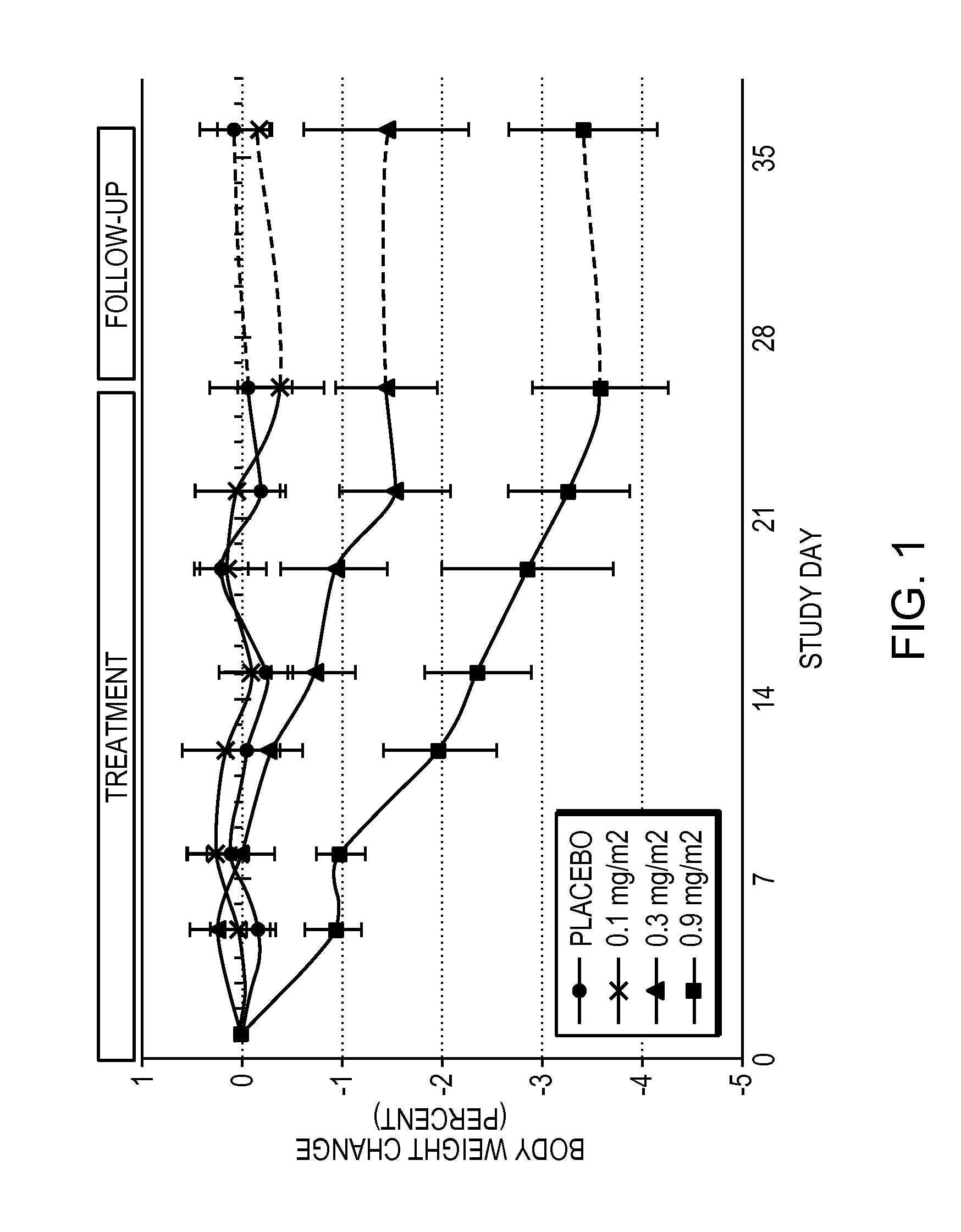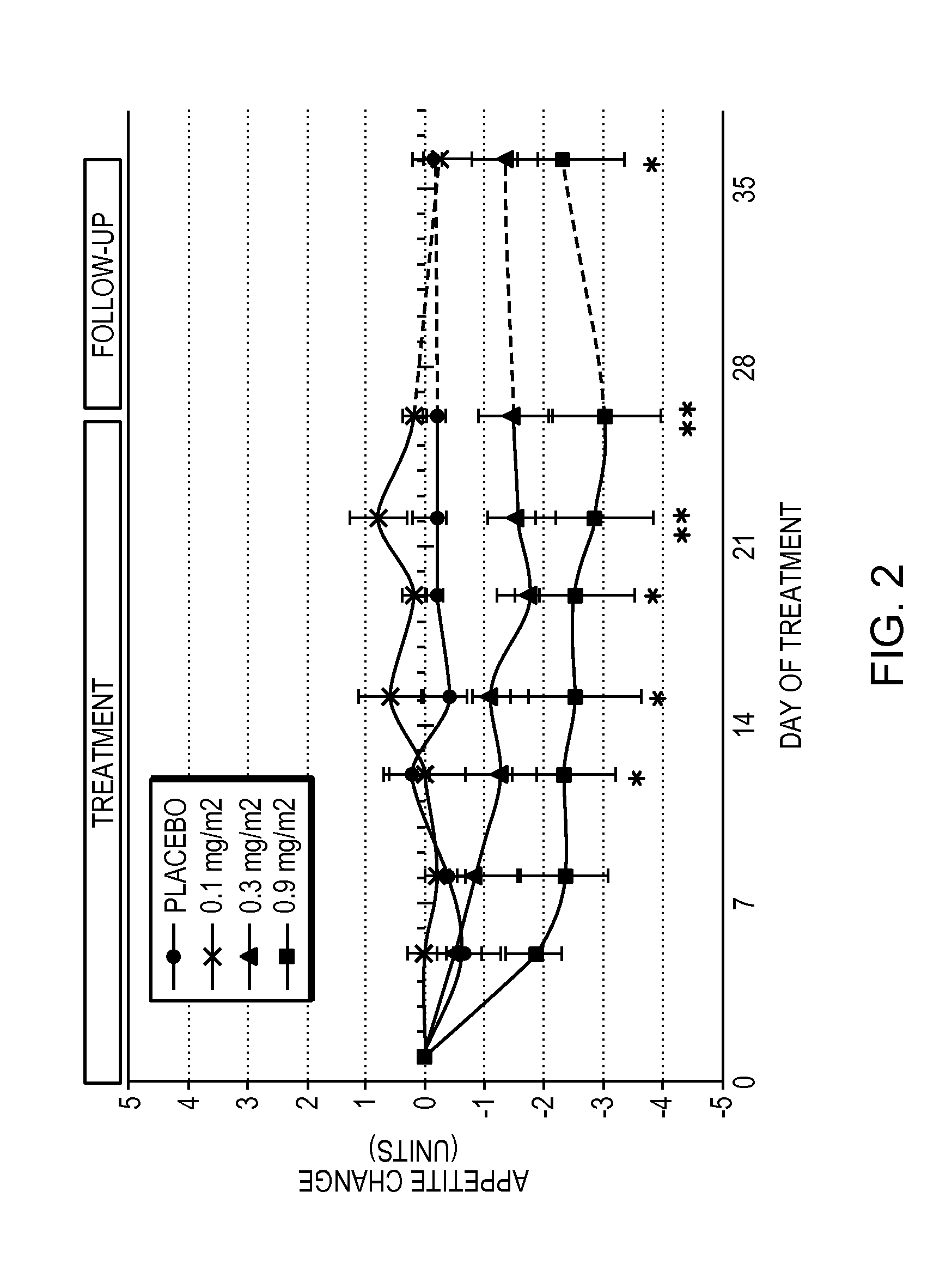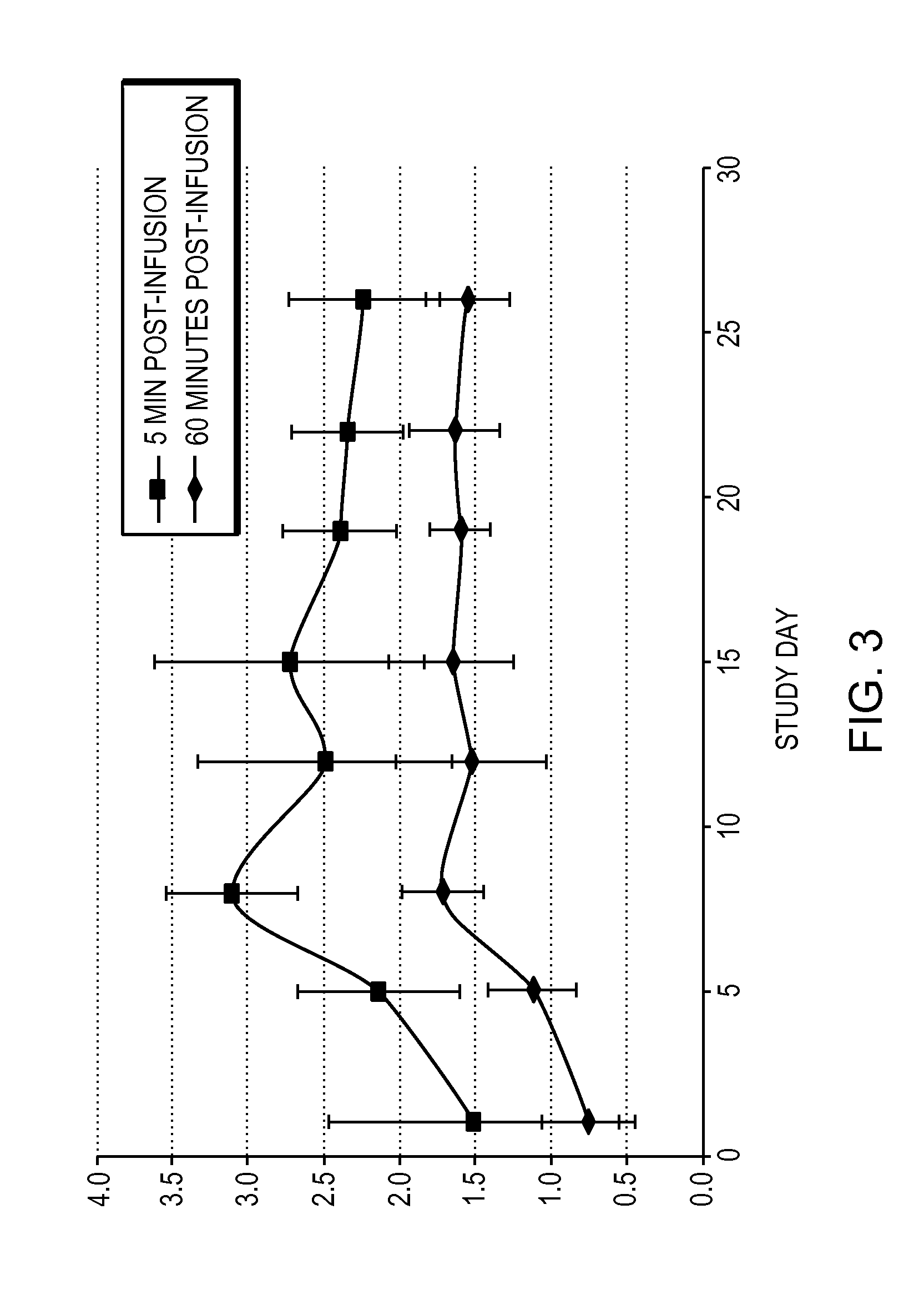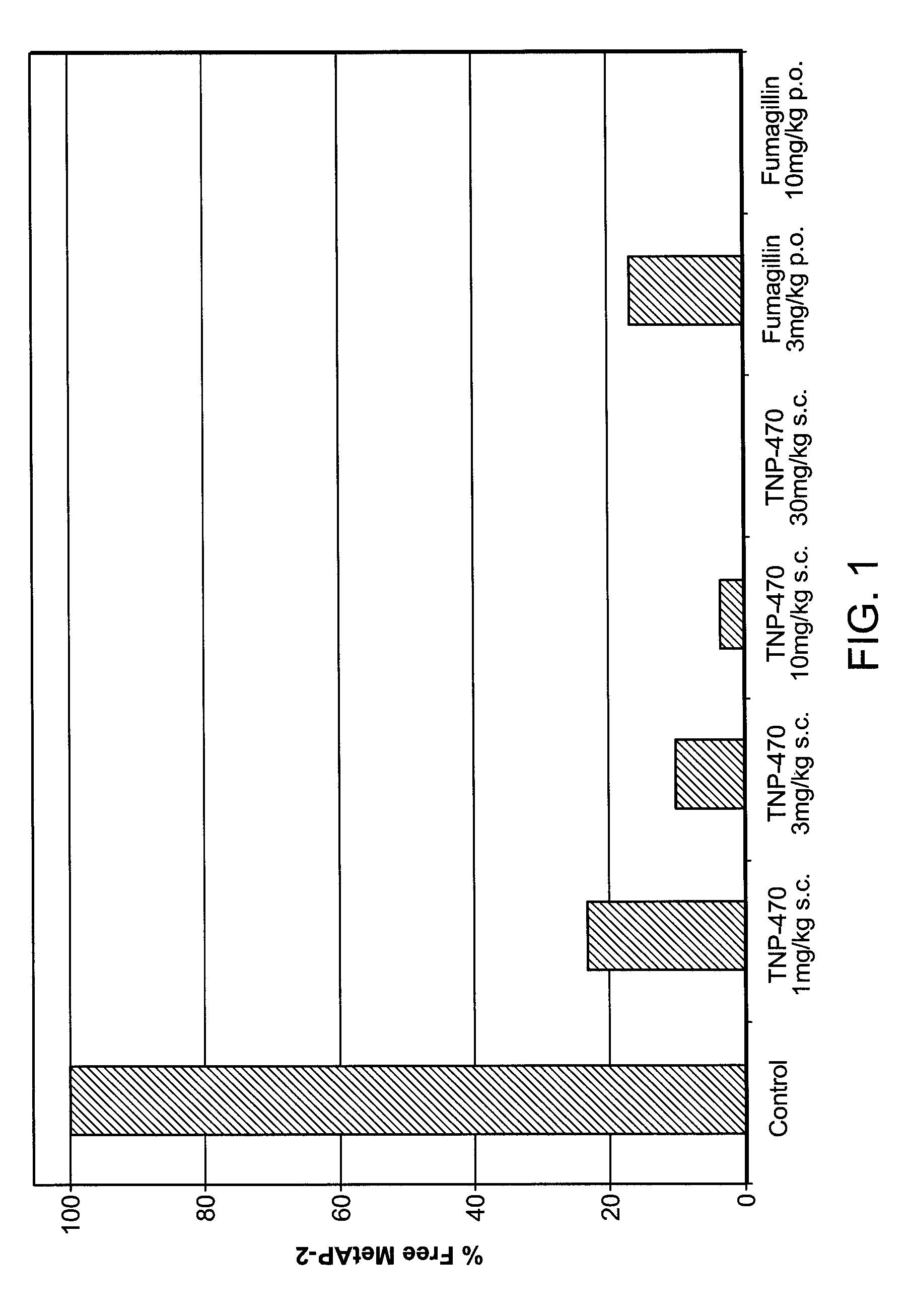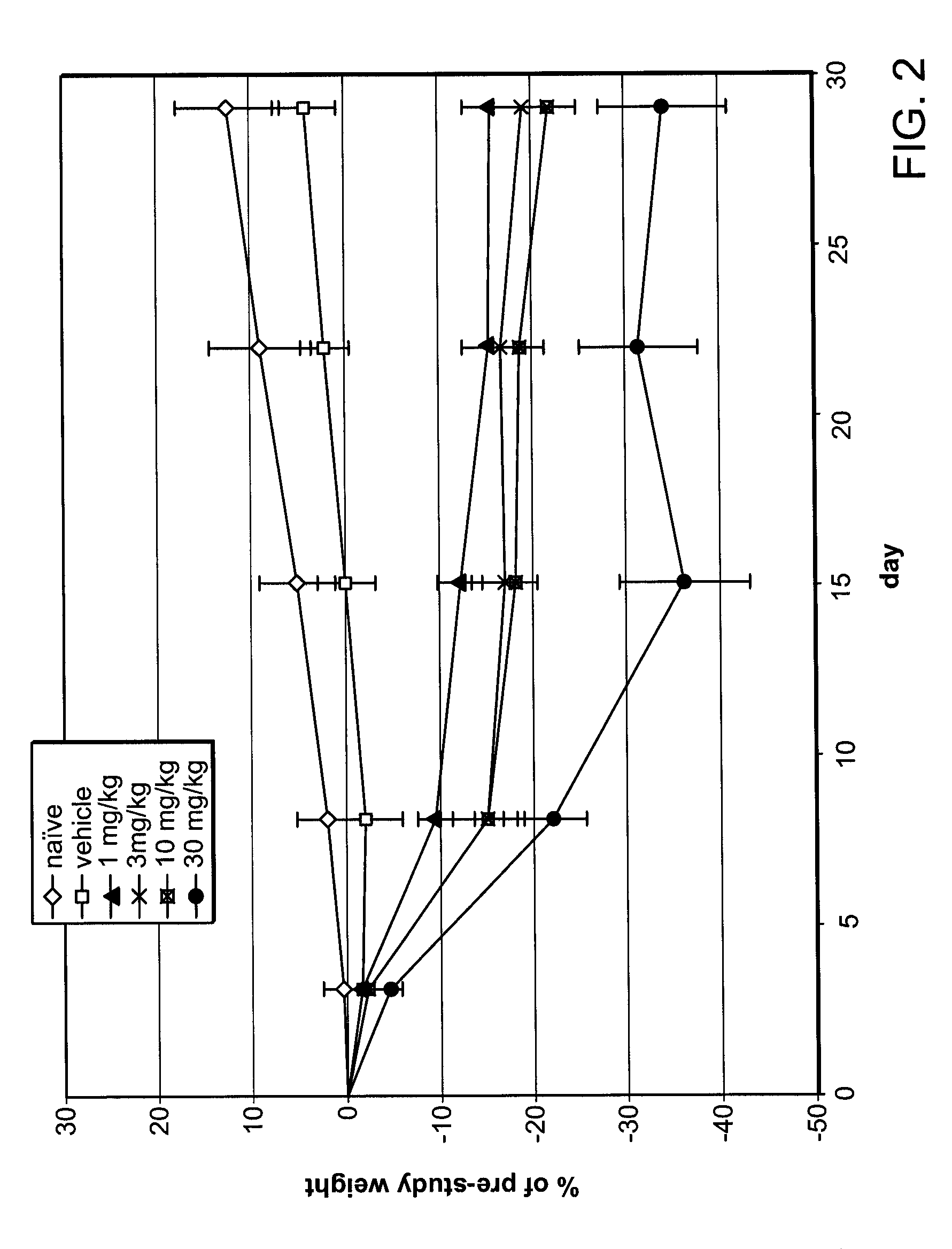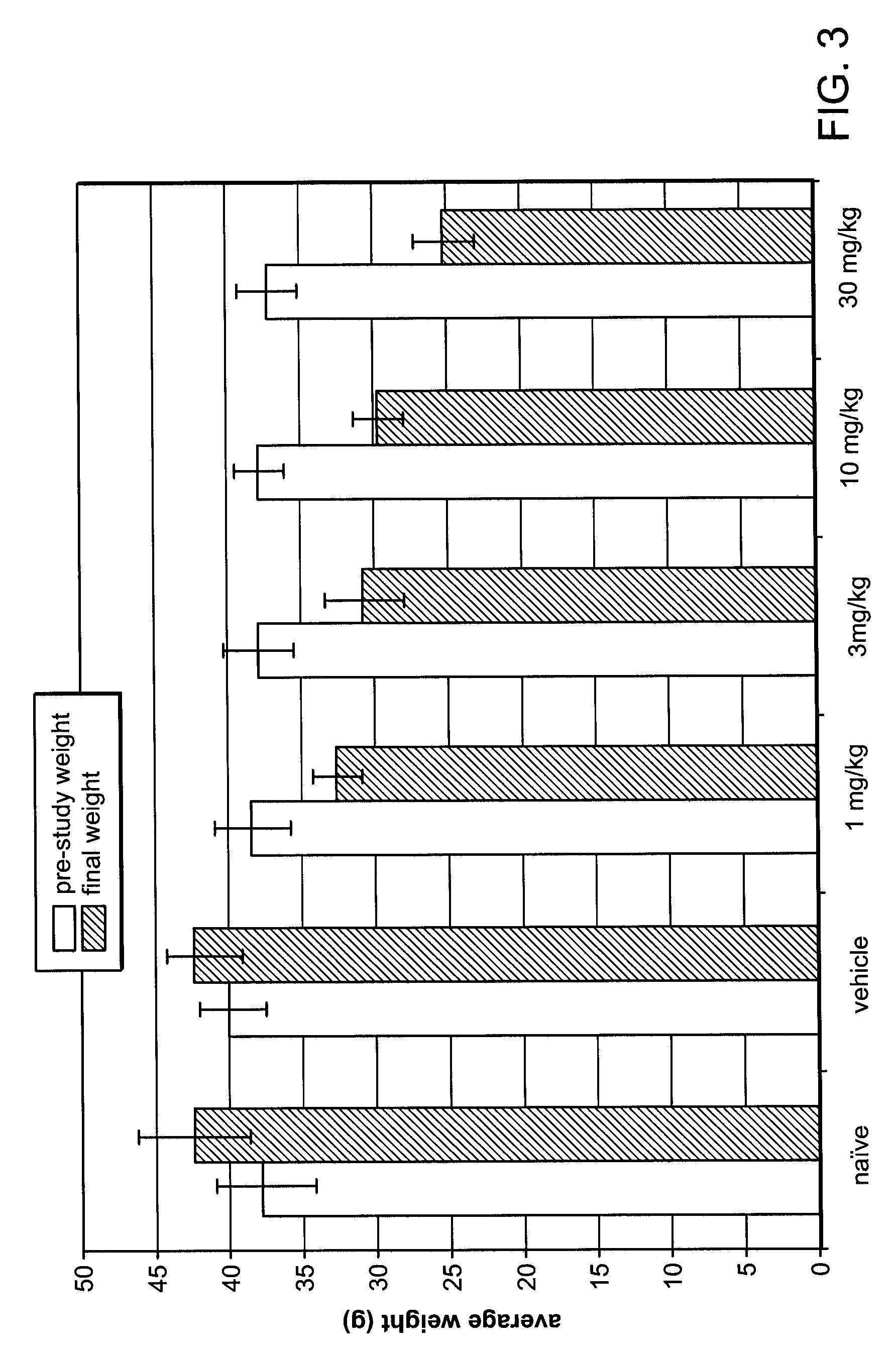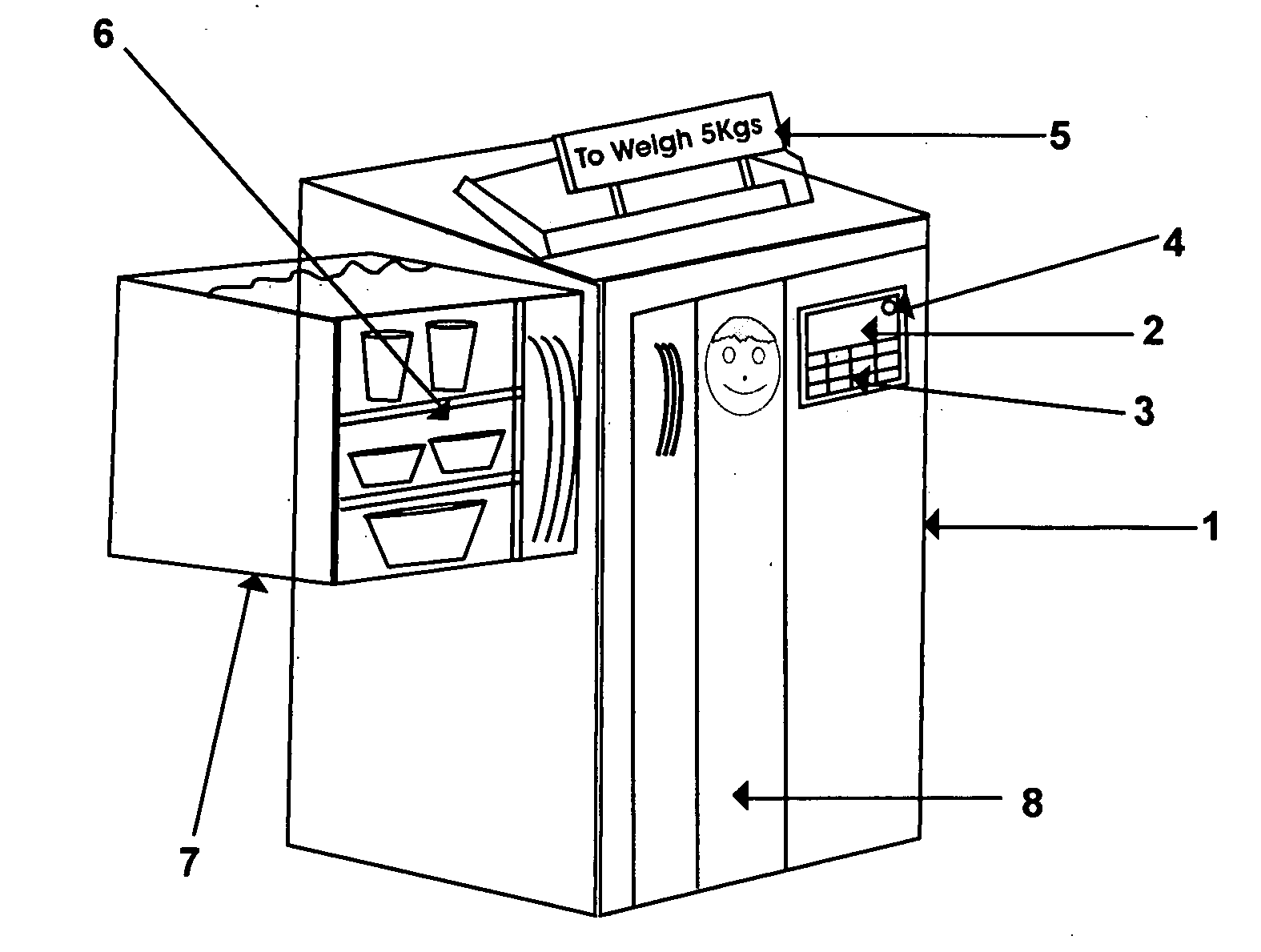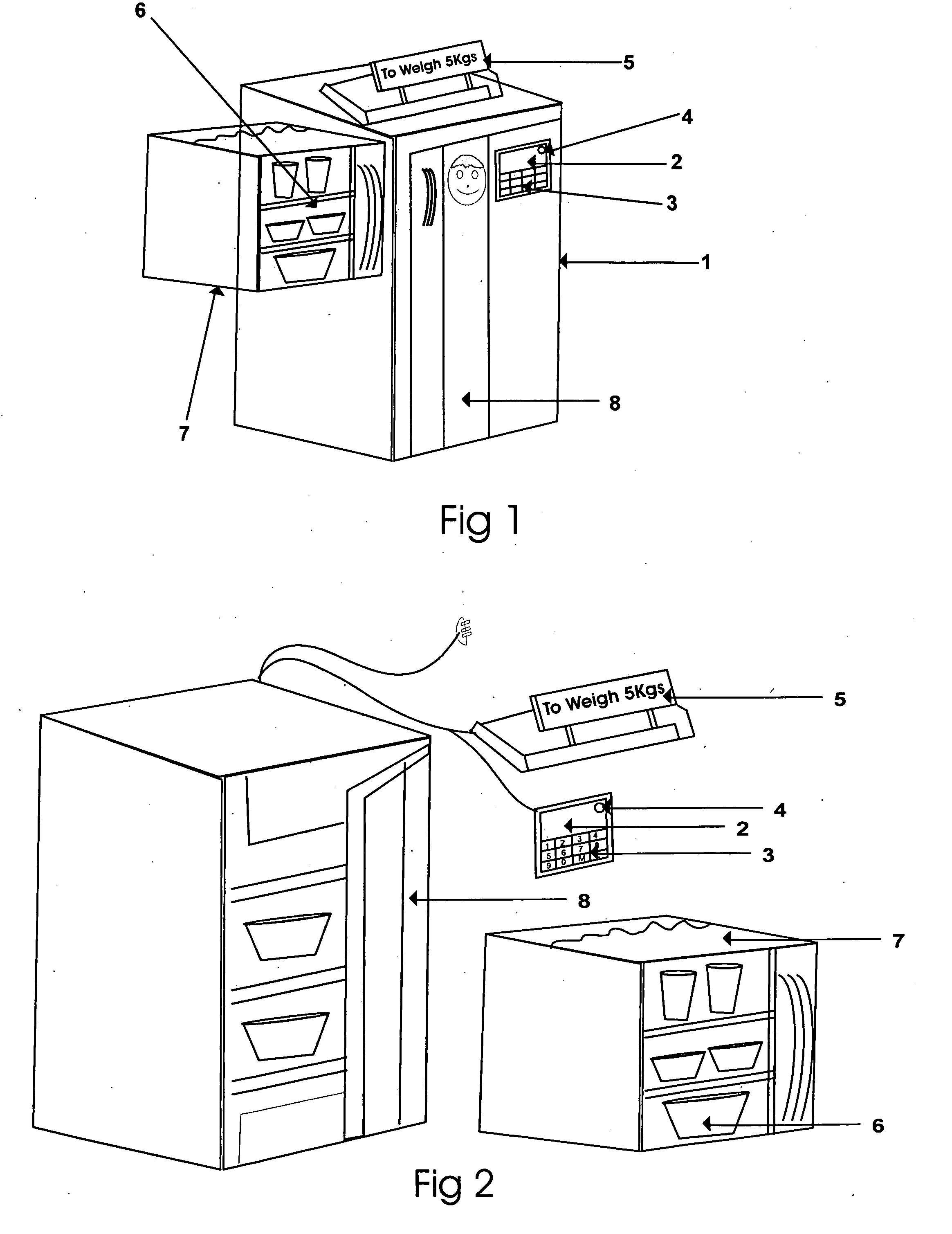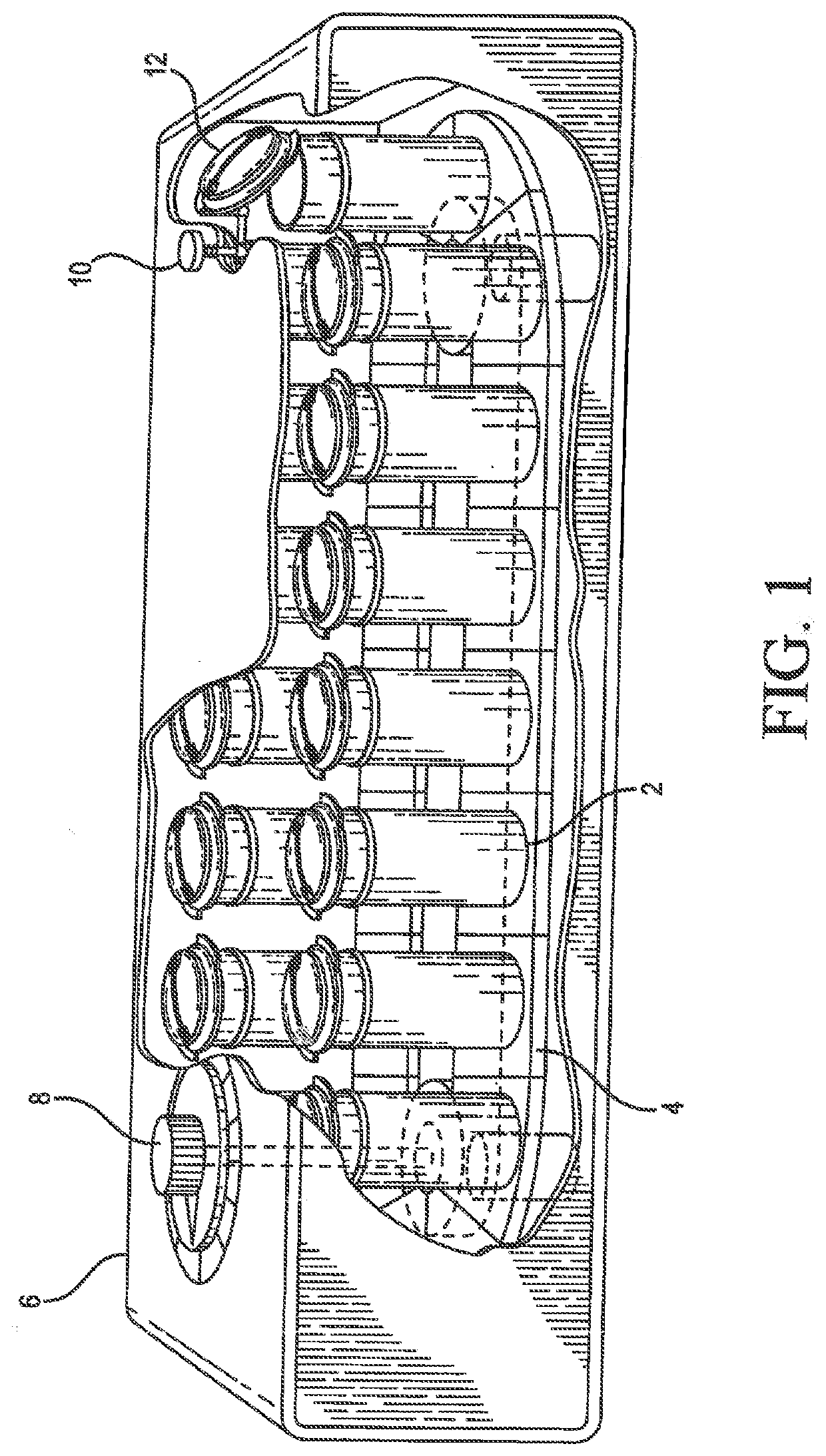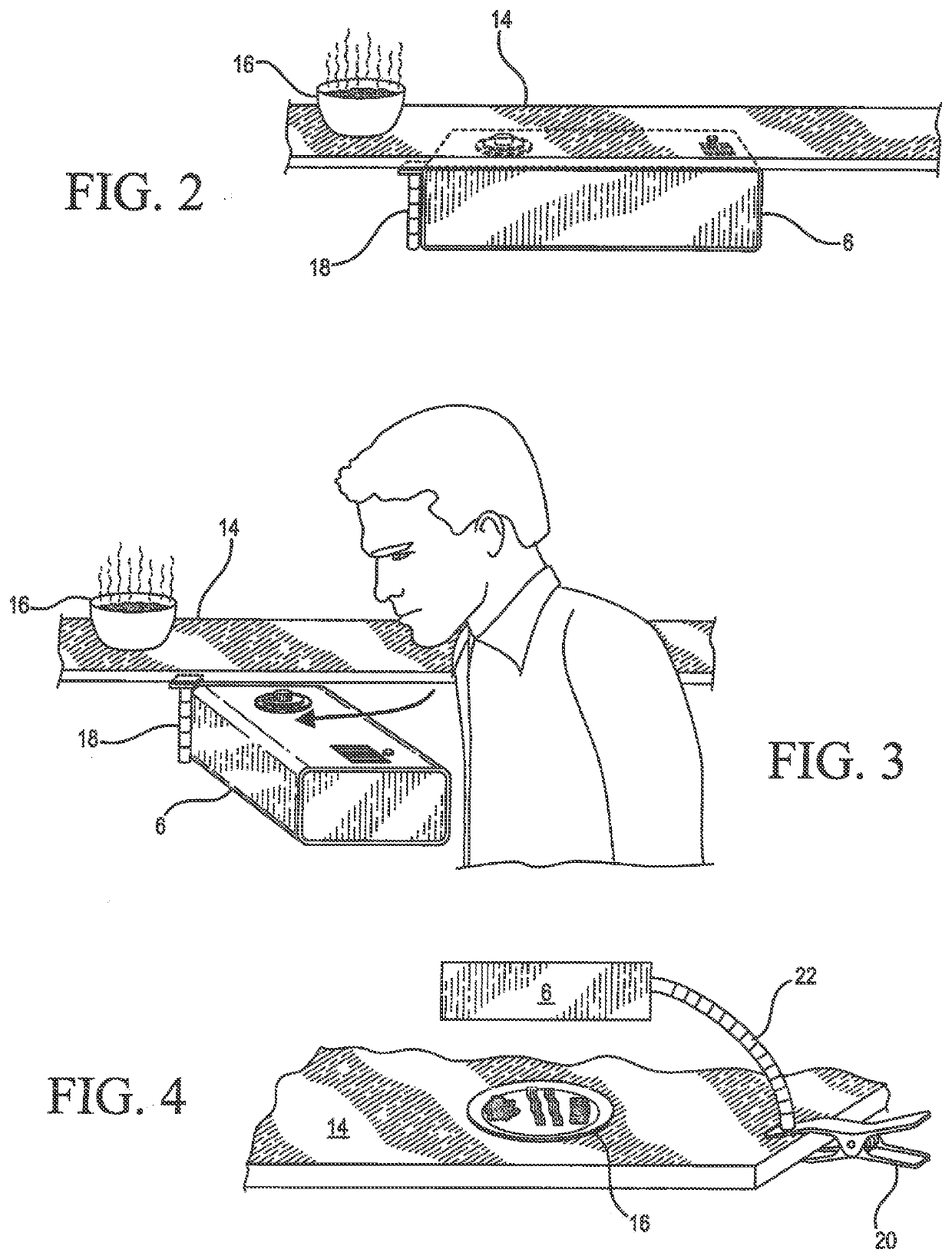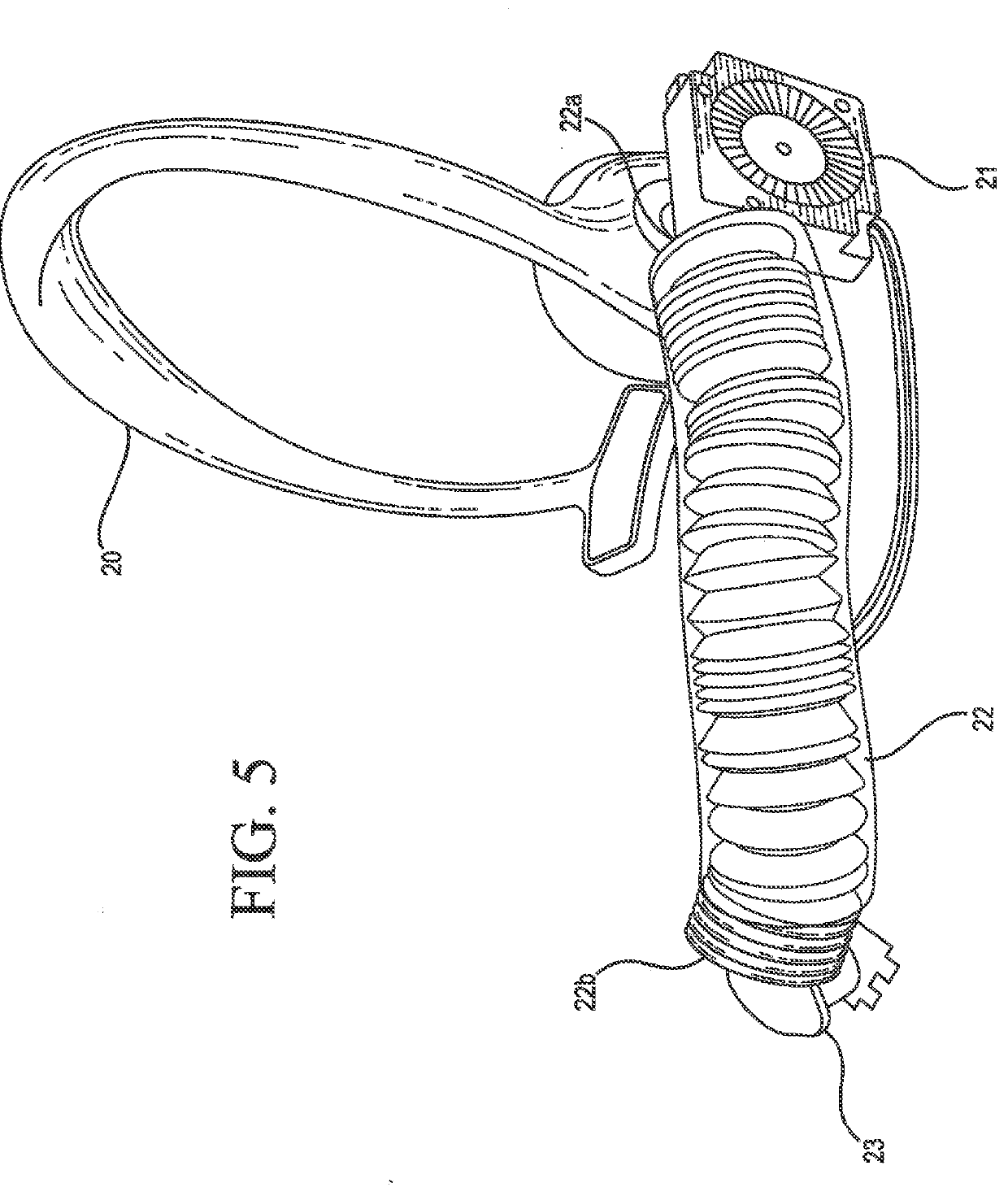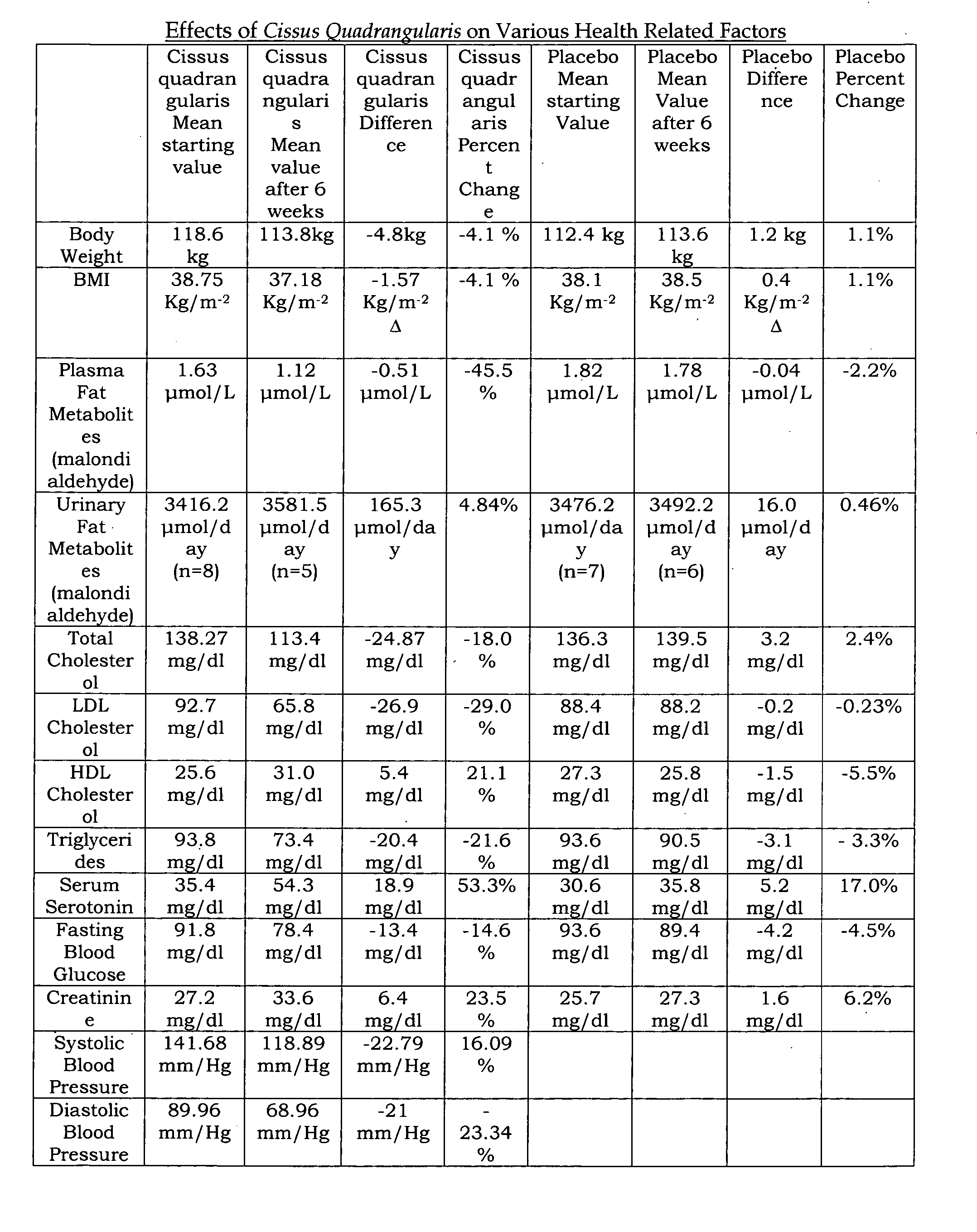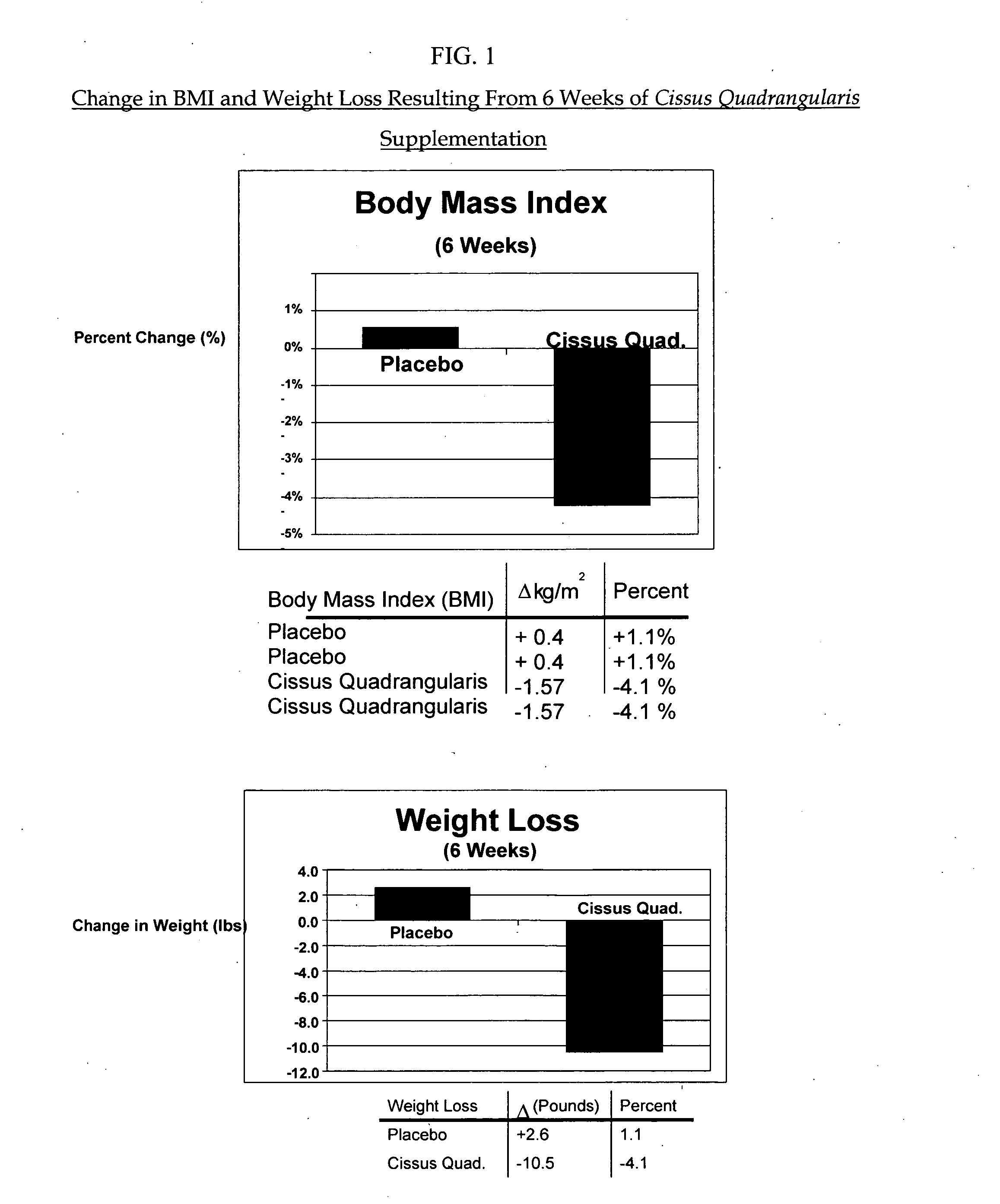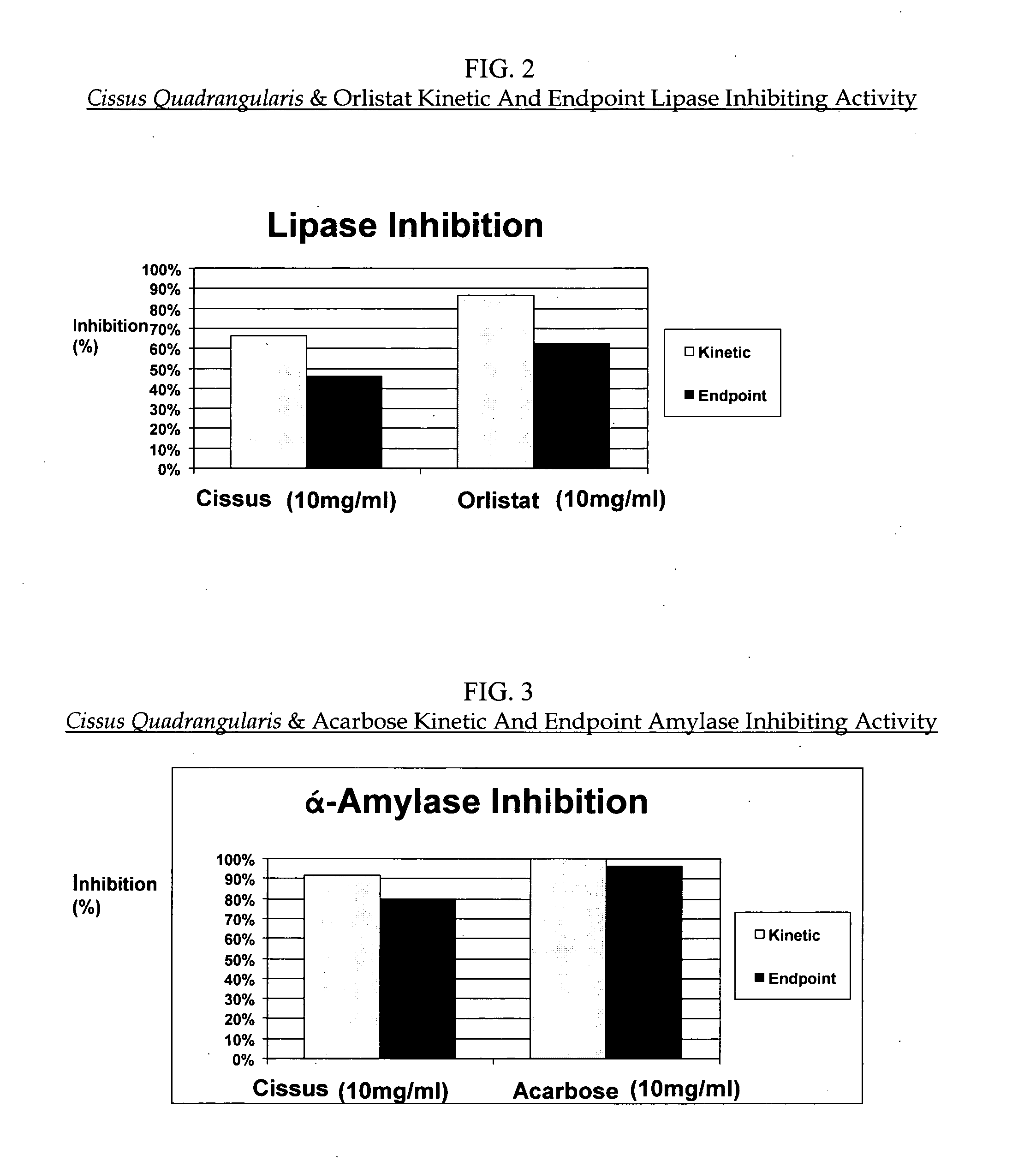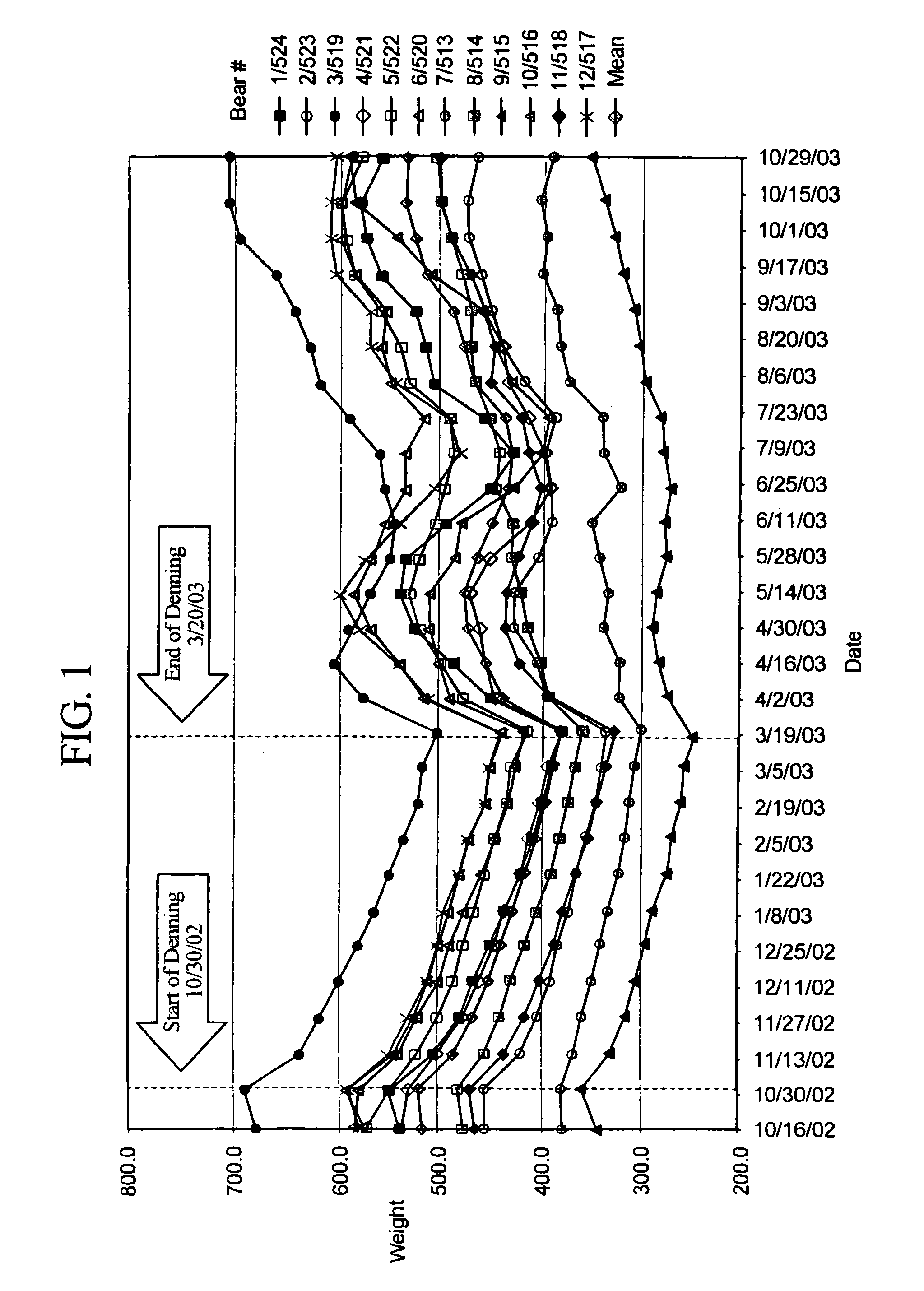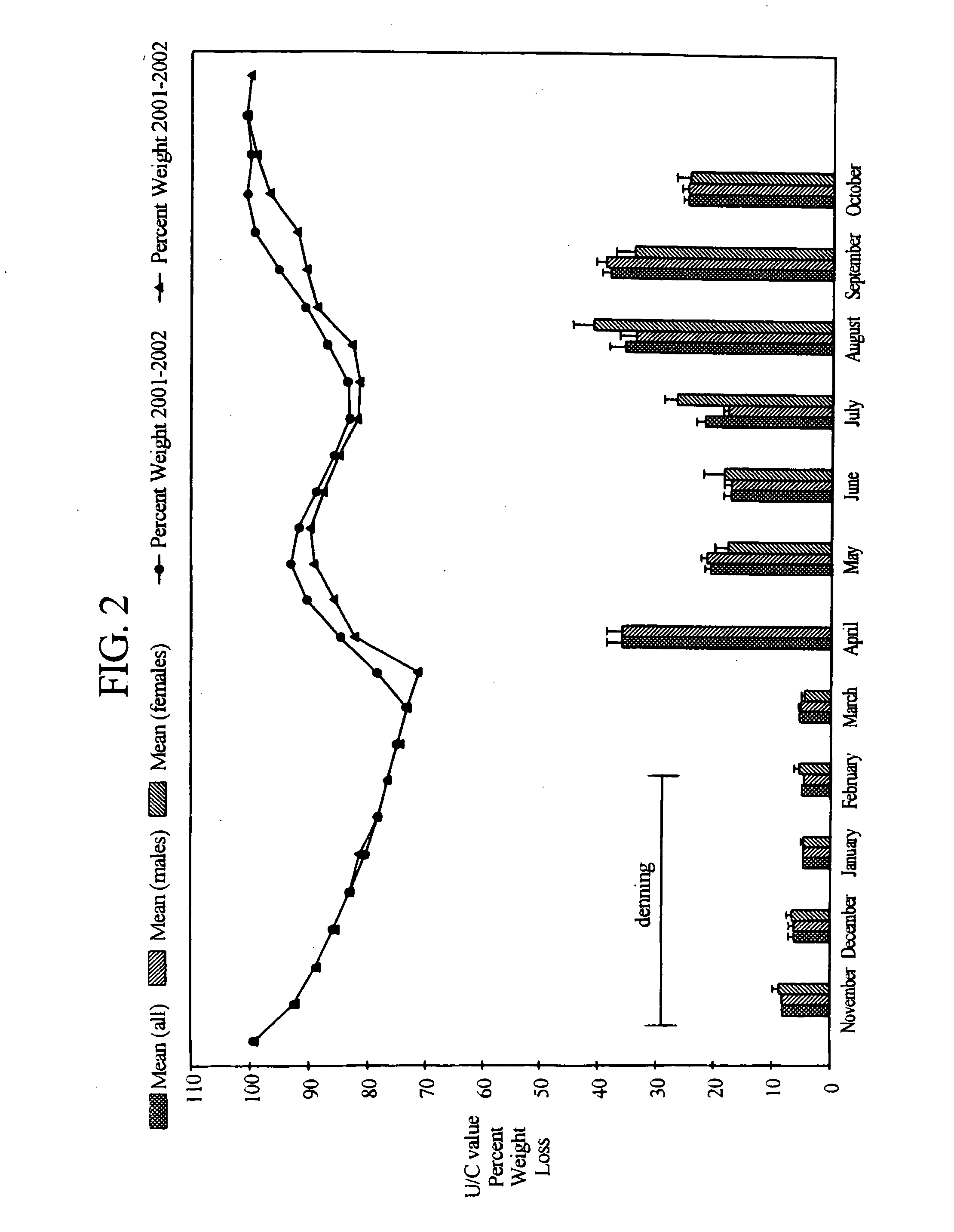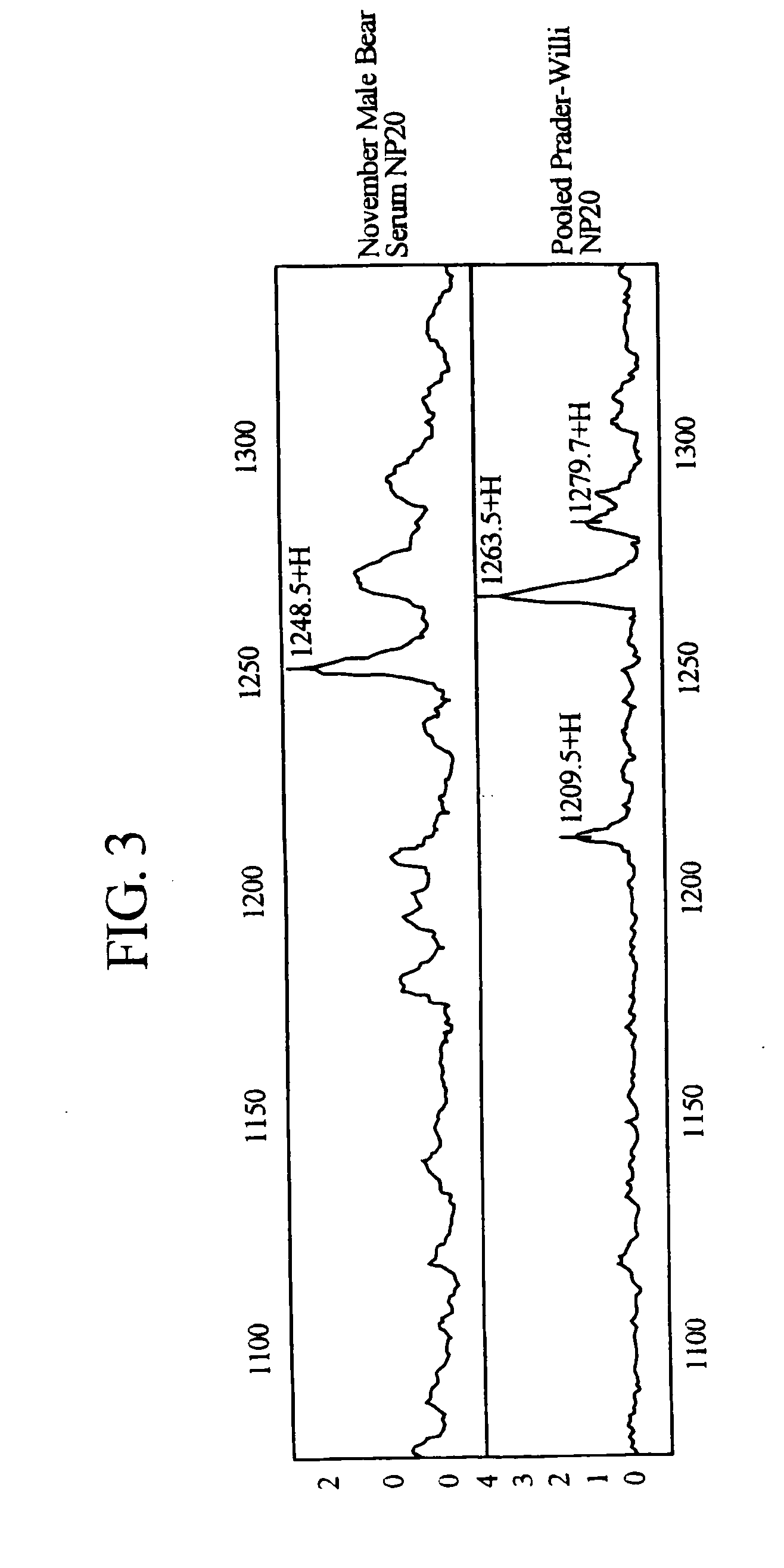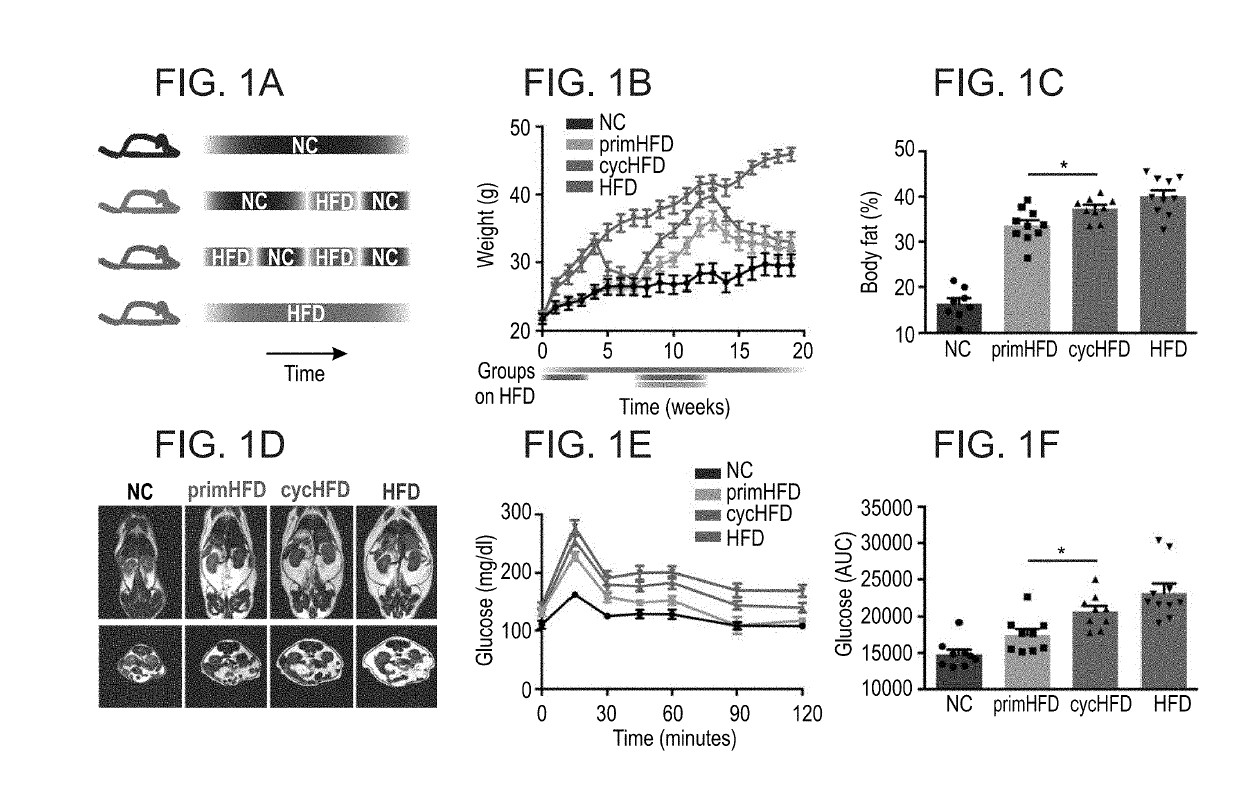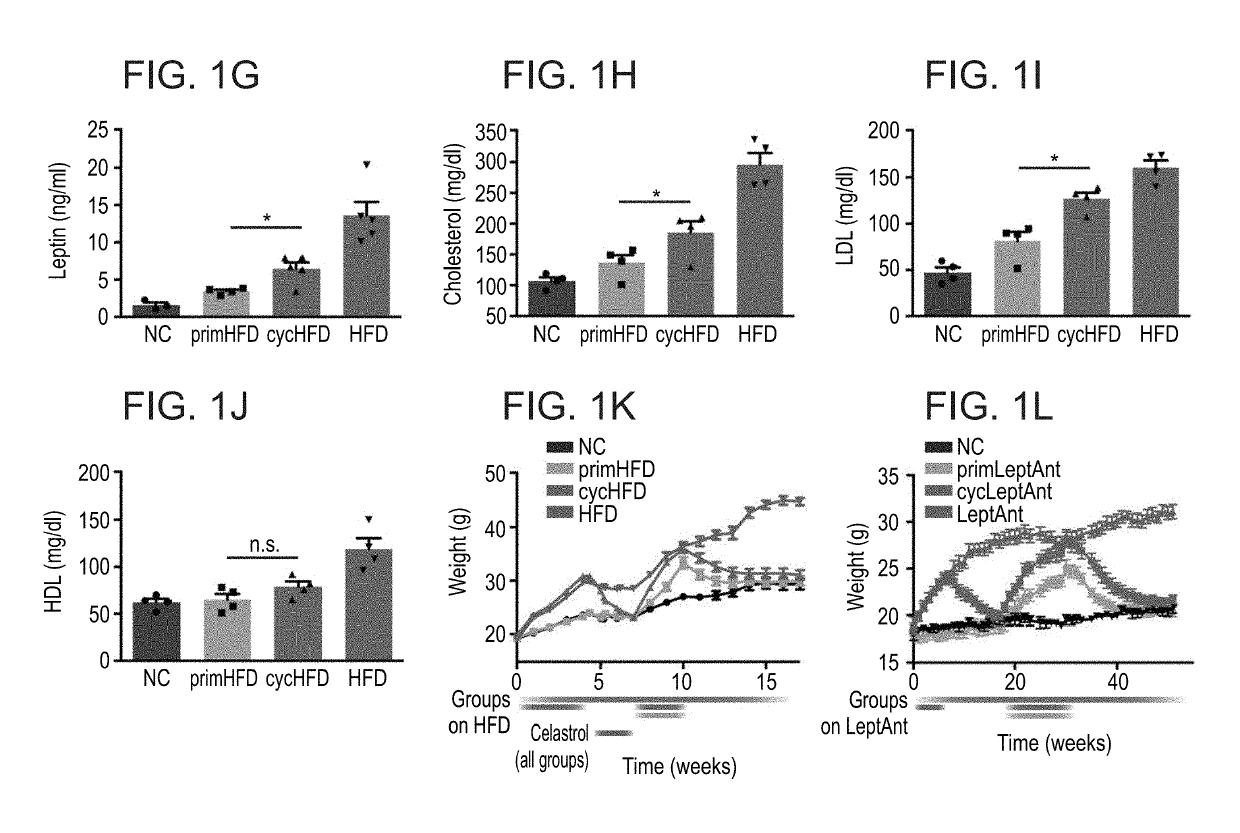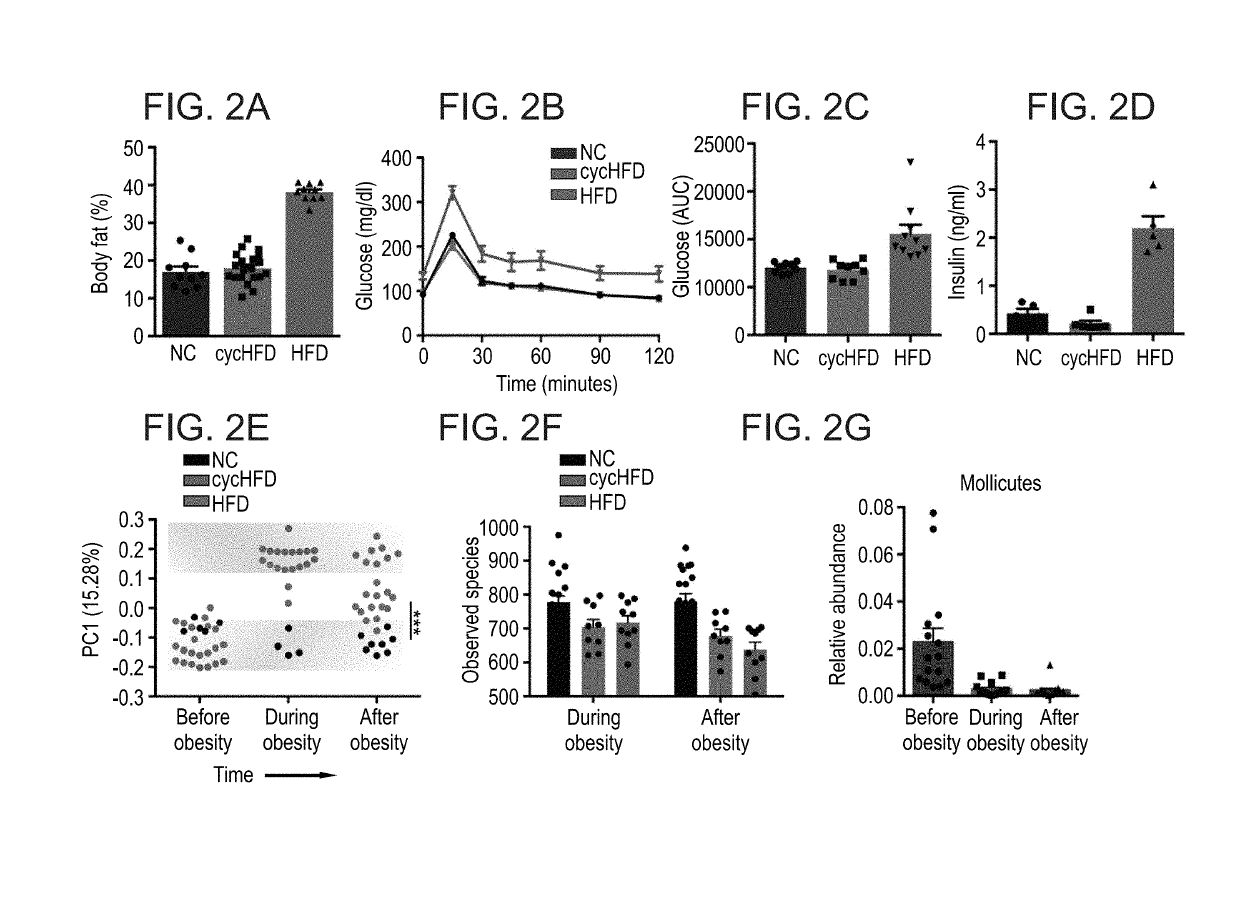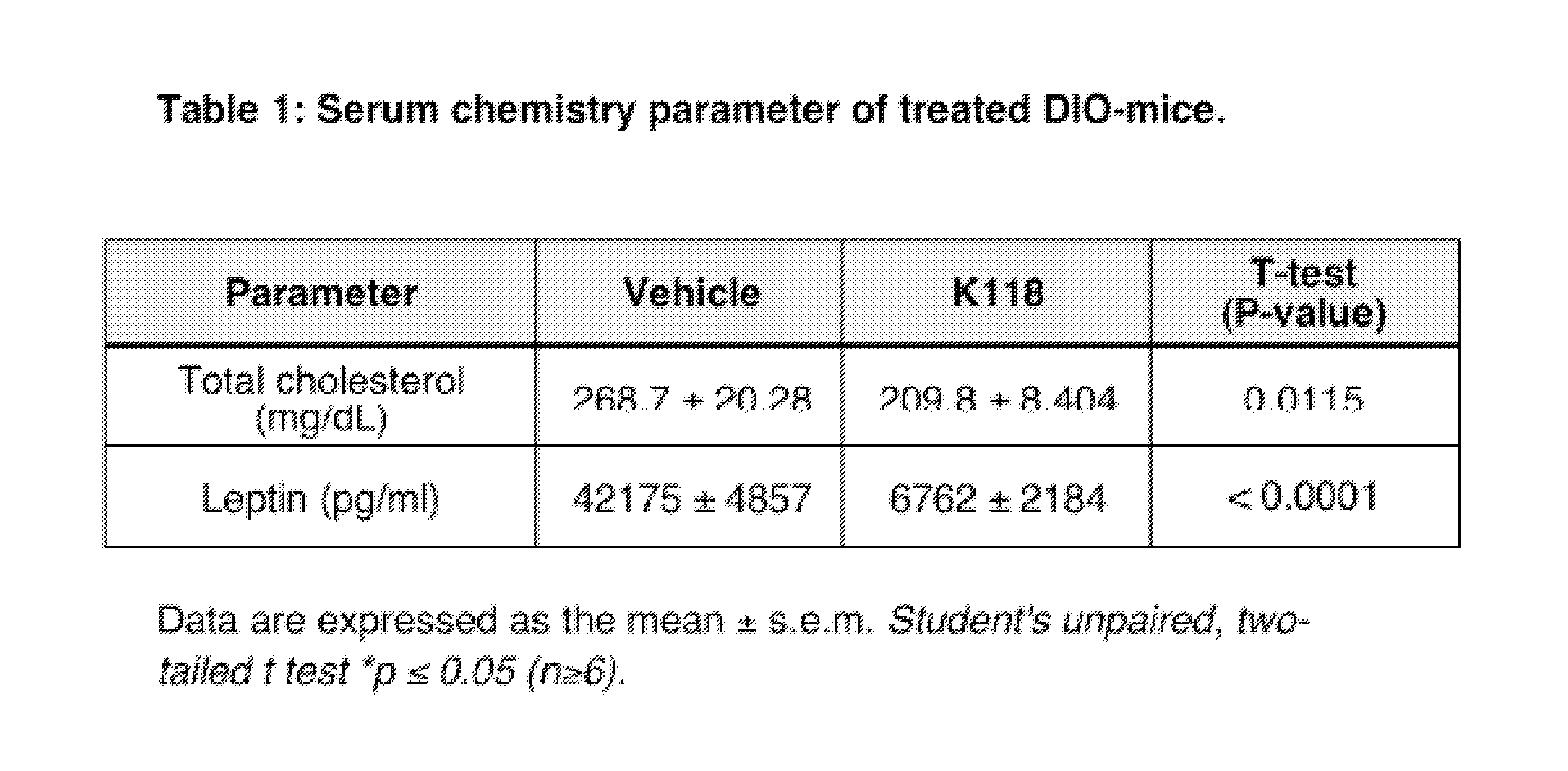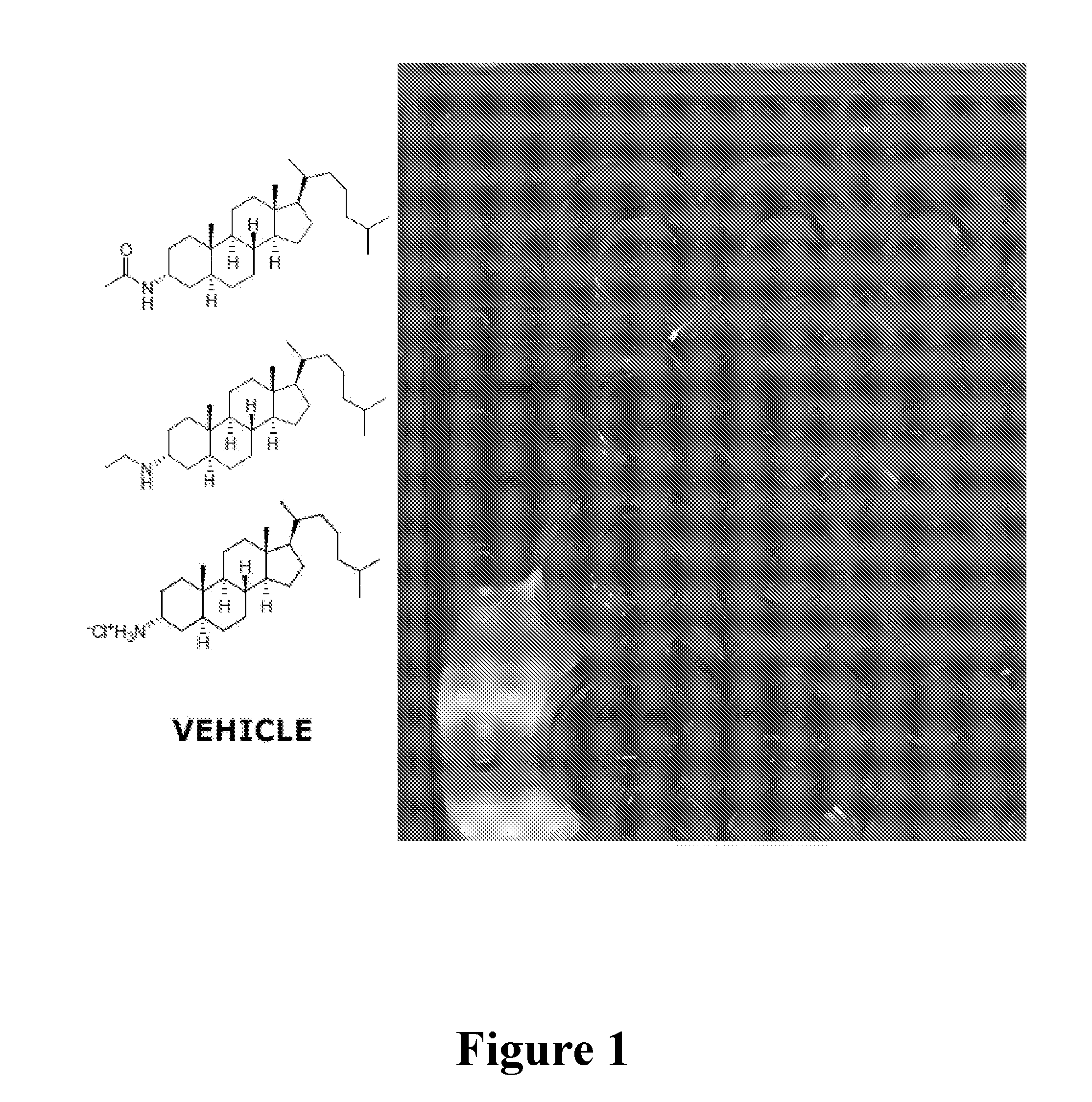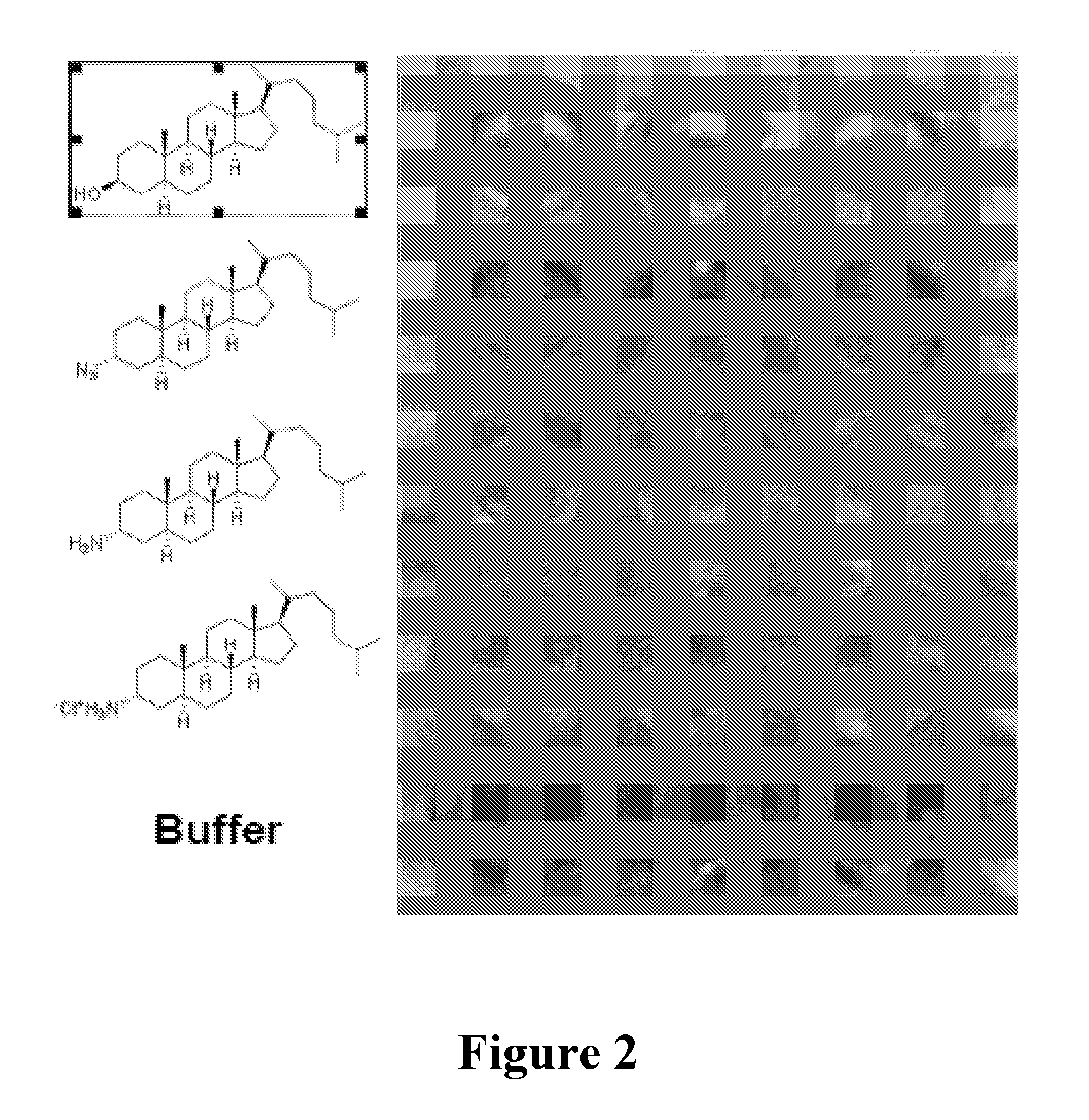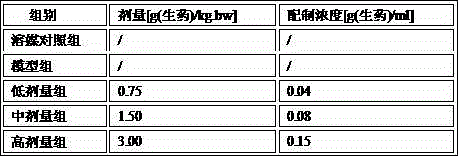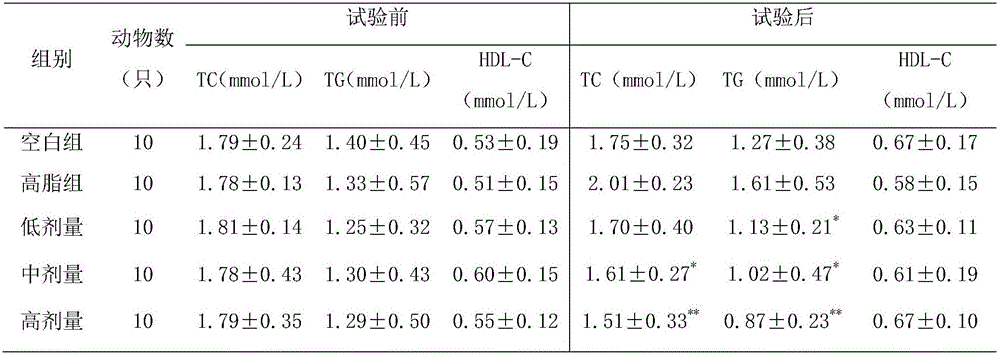Patents
Literature
68 results about "Obese subjects" patented technology
Efficacy Topic
Property
Owner
Technical Advancement
Application Domain
Technology Topic
Technology Field Word
Patent Country/Region
Patent Type
Patent Status
Application Year
Inventor
Methods of activating a melanocortin-4 receptor pathway in obese subjects
ActiveUS8476227B2Induce weight lossOrganic active ingredientsPeptide/protein ingredientsDefined ProcedureMC4 Receptor
Methods and therapeutics are provided for treating metabolic disorders by activation of melanocortin signaling pathways. Generally, the methods and therapeutics can induce activation of melanocortin receptor signaling to increase energy expenditure and induce weight loss. In one embodiment, a method for performing a diagnostic procedure can be chosen, energy expenditure then assess in light of the diagnostic procedure and a definitive procedure(s) can be selected dependent on the outcome of the energy assessment. In another embodiment, a diagnostic procedure can be chosen to activate melanocortin receptor pathways, energy expenditure can be assessed and a definitive procedure(s) can be chosen that selectively and optimally activate melanocortin receptor pathways.
Owner:ETHICON ENDO SURGERY INC +1
Methods of treating an overweight or obese subject
InactiveUS20100016425A1Reduce weightReduces BMIOrganic active ingredientsBiocidePharmaceutical formulationObese subjects
The invention herein generally relates to pharmaceutical formulations and methods of treating an overweight or obese subject, and overweight- or obesity-related conditions.
Owner:ZAFGEN
Therapeuticbed for pregnant, obese and/or special needs patients or patrons
A therapeutic bed or treatment table capable of being employed for a massage or rendering chiropractic, medical, therapeutic, or other treatment to a patient or customer includes an upper torso support cushion having a plurality of breast recesses configured for accommodating human breasts; and an abdominal support cushion having an abdominal recess configured for accommodating a mid-section of an obese person or pregnant woman, wherein the plurality of recesses is configured to provide an adjustable support structure adaptive to the size of the human breasts and / or the mid-section of an obese person or pregnant woman. In an alternative embodiment, an unitary torso-abdominal support cushion is provided having a recess configured for accommodating human breasts and accommodating the mid-section of an obese person or pregnant woman.
Owner:GAGLIARDI NELLA
Flour suitable for obese patients
The invention relates to flour suitable for obese patients. The special meal flour for preparing foods for obese patients is prepared in the by uniformly mixing power made of rhizoma polygonati, semencassiae, gingko, raw hawthorn, tuckahoe, white lablab bean, Chinese yam and semen coicis with whole wheat (with a husk), oat, azuki bean and black bean. The flour can be used for producing various foods suitable for obese patients to eat as a principle food. The flour has the obvious effects of systemically adjusting lipid metabolism and glucose metabolism, losing weight, lowering blood fat, improving microcirculation and eliminating radicals. The special meal flour is suitable for patients with adiposity, adiposis hepatica, hyperlipemia, high blood viscosity, hypertension and diabetes mellitus, and for middle-aged and old people to keep healthy and eat.
Owner:杨波
Fat-binding polymers
InactiveUS7049345B2Efficient bindingEffective absorptionPharmaceutical delivery mechanismSkeletal disorderHypertriglyceridemiaSide effect
The present invention provides fat-binding polymers, which comprise dialkanolamine, dialkanolammonium, aminoalkylpolyol, and ammoniumalkylpolyol pendant groups for subjects in need of fat removal from the gastrointestinal tract, particularly subjects suffering from steatorrhea and / or experiencing side effects from lipase inhibitors. Patients being administered with lipase inhibitors are typically being treated for Type II Diabetes, streatorrhea, and hypertriglyceridemia. The fat binding polymers of this invention are also suitable for use with obese subjects.
Owner:GENZYME CORP
Fat-binding polymers
InactiveUS20060127353A1Avoid side effectsMinor side effectsMetabolism disorderDigestive systemHypertriglyceridemiaSide effect
The present invention provides fat-binding polymers, which comprise dialkanolamine, dialkanolammonium, aminoalkylpolyol, and ammoniumalkylpolyol pendant groups for subjects in need of fat removal from the gastrointestinal tract, particularly subjects suffering from steatorrhea and / or experiencing side effects from lipase inhibitors. Patients being administered with lipase inhibitors are typically being treated for Type II Diabetes, streatorrhea, and hypertriglyceridemia. The fat binding polymers of this invention are also suitable for use with obese subjects.
Owner:GENZYME CORP
Treatment of obesity using non-daily administration of 6-O-(4-dimethylaminoethoxy) cinnamoyl fumagillol
The invention generally relates to methods of treating an overweight or obese subject, and treating overweight- or obesity-related conditions using non-daily administration of e.g., a MetAP-2 inhibitor.
Owner:ZAFGEN
Treatment of obesity using non-daily administration of 6-O-(4-dimethylaminoethoxy) cinnamoyl fumagillol
InactiveUS9000035B2Lose weightReduce weightBiocideMetabolism disorderObese subjectsOral administration
Owner:ZAFGEN
Method for preventing and/or treating insulin resistance
Described is the use of Eubacterium hallii et rel. and / or Alcaligenes faecalis et rel., as well as pharmaceutical, food, or feed compositions comprising these bacteria as a medicament, in particular, for preventing and / or treating insulin resistance and / or insulin resistance-related complications such as metabolic syndrome, dyslipidemia and type 2 diabetes mellitus, as well as insulin resistance in endocrine diseases (e.g., obese subjects with type 1 diabetes mellitus, Cushing's disease and lipodystrophy syndromes. Also described is a method for preventing and / or treating insulin resistance and / or insulin resistance-related complications such as dyslipidemia and type 2 diabetes mellitus as well as insulin resistance in endocrine diseases (e.g., obese subjects with type 1 diabetes mellitus, Cushing's disease and lipodystrophy syndromes) in a subject in need thereof, the method comprising the step of increasing the level of Eubacterium hallii et rel. and / or Alcaligenes faecalis et rel. in the small intestine.
Owner:ACADEMISCH MEDISCH CENT BIJ DE UNIV VAN
Treatment of Obesity Using Non-Daily Administration of 6-O-(4-Dimethylaminoethoxy) Cinnamoyl Fumagillol
The invention generally relates to methods of treating an overweight or obese subject, and treating overweight- or obesity-related conditions using non-daily administration of e.g., a MetAP-2 inhibitor.
Owner:ZAFGEN
Method for preventing and/or treating insulin resistance
Described is the use of Eubacterium hallii et rel. and / or Alcaligenes faecalis et rel., as well as pharmaceutical, food, or feed compositions comprising these bacteria as a medicament, in particular, for preventing and / or treating insulin resistance and / or insulin resistance-related complications such as metabolic syndrome, dyslipidemia and type 2 diabetes mellitus, as well as insulin resistance in endocrine diseases (e.g., obese subjects with type 1 diabetes mellitus, Cushing's disease and lipodystrophy syndromes. Also described is a method for preventing and / or treating insulin resistance and / or insulin resistance-related complications such as dyslipidemia and type 2 diabetes mellitus as well as insulin resistance in endocrine diseases (e.g., obese subjects with type 1 diabetes mellitus, Cushing's disease and lipodystrophy syndromes) in a subject in need thereof, the method comprising the step of increasing the level of Eubacterium hallii et rel. and / or Alcaligenes faecalis et rel. in the small intestine.
Owner:ACADEMISCH MEDISCH CENT BIJ DE UNIV VAN
Treatment of Obesity Using Non-Daily Administration of 6-O-(4-Dimethylaminoethoxy) Cinnamoyl Fumagillol
InactiveUS20140045935A1Lose weightReduce weightBiocideOrganic active ingredientsObese subjectsOral administration
The invention generally relates to methods of treating an overweight or obese subject, and treating overweight- or obesity-related conditions using non-daily administration of e.g, a MetAP-2 inhibitor.
Owner:ZAFGEN
Application of Chinese yam polysaccharide in preparation of medicament for treating obesity
InactiveCN101810636AEffective treatmentReduce high blood sugarOrganic active ingredientsPowder deliveryAcute hyperglycaemiaAdditive ingredient
The invention relates to an application of Chinese yam polysaccharide in the preparation of a medicament for treating obesity. The Chinese yam polysaccharide is an active ingredient which is extracted and separated from dry rhizomes of Chinese yam, and the extracted and separated Chinese yam polysaccharide and pharmaceutically acceptable carriers or auxiliary ingredients are prepared into a pharmaceutical preparation such as capsules, granules, tablets, pulvis, oral liquid or syrups. A great number of clinical observations and animal experiments show that the Chinese yam polysaccharide has good weight-reducing effect, can be used for curing and improving obesity, effectively reduces the weight of the salad dodger, and is especially applicable to patients with obesity, who also suffer from hyperglycemia, lower immune response and premature senility.
Owner:新疆帕米尔维吾尔药业有限公司
Processing and cooking of food with a low glycemic impact for the nutrition of diabetics, obese and for weight reducing diets
InactiveUS20110151076A1Reduce glycemic loadReduce anxietyDirect dough preparationMilk preparationLow glucoseDigestion
In order to reduce the glycemic load in the daily nutrition of diabetics, obese and for weight-reducing diets, this invention claims cooking or baking processes and other procedures for food—rich in carbohydrates—in which, the structure of the raw complex carbohydrates (amylose, amylopectin, etc.) is mostly preserved and / or short saccharides are encapsulated. This objective is attained by reducing the magnitude of the complex carbohydrate fractioning by the undesired effect of adiabatic heating during grain grinding, or during conventional cooking and also through the encapsulation of already processed monosaccharide's, disaccharides or broken carbohydrate chains in capsules within denaturalized protein matrixes, in order to make their digestion deeper and longer. These processes and procedures allow the ingestion of less restricted portions of food, very similar to the conventional ones (bread, rice, potato, pastas) while due to their prolonged digestion, it naturally limits the immediate production of glucose. This type of food is defined as: “Deep Diet” or “Deep Nutrition” (Dieta Profunda in Spanish). These processes and procedures allow preparing food recipes and flavors very similar to those of a conventional nature (bread, rice, potatoes, pasta) while because of their prolonged digestion are able to reduce the immediate production of glucose (Glycemic Index), thus generating healthier conditions for diabetics and obese, appetite satisfaction and reduction of food anxiety.
Owner:ZAPP GLAUSER JORGE LUIS
Method for preventing and/or treating insulin resistance
Described is the use of Eubacterium hallii et rel. and / or Alcaligenes faecalis et rel., as well as pharmaceutical, food, or feed compositions comprising these bacteria as a medicament, in particular, for preventing and / or treating insulin resistance and / or insulin resistance-related complications such as metabolic syndrome, dyslipidemia and type 2 diabetes mellitus, as well as insulin resistance in endocrine diseases (e.g., obese subjects with type 1 diabetes mellitus, Cushing's disease and lipodystrophy syndromes. Also described is a method for preventing and / or treating insulin resistance and / or insulin resistance-related complications such as dyslipidemia and type 2 diabetes mellitus as well as insulin resistance in endocrine diseases (e.g., obese subjects with type 1 diabetes mellitus, Cushing's disease and lipodystrophy syndromes) in a subject in need thereof, the method comprising the step of increasing the level of Eubacterium hallii et rel. and / or Alcaligenes faecalis et rel. in the small intestine.
Owner:ACADEMISCH MEDISCH CENT BIJ DE UNIV VAN
Fruity soda water with zero heat
InactiveCN102450721ARaw materials are easy to obtainGreat tasteFood preparationBiotechnologySodium bicarbonate
The invention discloses a fruity soda water with zero heat. The fruity soda water with zero heat mainly comprises, by weight, 0.01-1 part of stevioside, 0.1-10 parts of erythrose alcohol, 0.5-0.8 part of sodium bicarbonate, 0.0005-0.001 part of calcium chloride, 0.0005-0.001 part of magnesium sulfate, 0.0005-0.003 part of sodium sulfate, 0.5-0.8 part of natural perfume, 0.01202-0.166 part of vitamin ingredient and purified water dissolved with carbon dioxide. The fruity soda water with zero heat has simple and easily available raw materials, good mouthfeel and no heat, is suitable for diabetes patient, the obese and the group needing less energy intake, and has good health care function. Materials used in the invention contain no heat, provide a product with diversified taste and supplement everyday vitamin loss in human body; addition of erythritol benefits functions of metabolism and toxin expelling and satisfies diversified mouthfeel demand and pursuit of people for health.
Owner:JINAN HANDING BIOENG
Methods of treating an overweight or obese subject
InactiveUS8865746B2Reduces BMILarge absorption profileBiocideMetabolism disorderPharmaceutical formulationObese subjects
The invention herein generally relates to pharmaceutical formulations and methods of treating an overweight or obese subject, and overweight- or obesity-related conditions.
Owner:ZAFGEN
Refrigerator for obese persons
InactiveUS20100258356A1Weighing auxillary devicesSpecial purpose weighing apparatusNutrientLoudspeaker
This is a modified fridge (1) with a food weighing balance (5), a visual display (2) with in built electronic control, input keys (3) and speaker (4). Pre-weighed food containers (6) are kept in a clean washable clean rack (7) fitted to sides or top. The electronic control with appropriate processor input and output devices, circuits and software integrates the fridge with food balance and visual display and speaker. User enters his code, opens fridge and loads in pre-weighed food container (6) his food and weighs it. The food type and container code are entered by input keys (3). The food balance calculates the food weight alone and sends to electronic control which calculates the calorie. Additional food of that meal is also weighed. The control calculates that meal, daily, weekly or monthly calorie chart and displays it. Similar charts for water, and other nutrients can be displayed Reflective mirror film (8) motivates for good control of eating.
Owner:ANANDAMPILLAI APARNA THIRUMALAI +2
Low calorie fruit juice beverage
The invention provides a low calorie fruit juice beverage. The beverage has the advantages of simple and easily available raw materials, good taste, utilization of a calorie-free purely natural sweetener, suitability for diabetic patients, obesity subjects and people needing reduced energy intake and a high health care function, and overcomes shortcomings of conventional fruit juice beverages. The low calorie fruit juice beverage in the invention mainly comprises the following raw materials of purified water, condensed fruit juice, stevioside, erythritol, a sour additive and natural perfume; the beverage further comprises a plurality of vitamin components, which supplements vitamins that human bodies lose every day; increased erythritol has the functions of metabolism and toxin expelling; addition of natural perfume of different taste enables people's demand for a plurality of flavor to be satisfied.
Owner:JINAN HANDING BIOENG
Compositions and methods of targeting apolipoprotein b for the reduction of apolipoprotein c-iii
ActiveUS20120129911A1Reduces plasma ApoC-III levelSymptoms improvedOrganic active ingredientsMetabolism disorderDiabetes mellitusApolipoprotein C
Disclosed herein are compositions and methods for lowering Apolipoprotein C-III (ApoC-III) in a subject in need thereof. Subjects in need of ApoC-III reduction include subjects with elevated ApoC-III levels, subjects with a condition associated with ApoC-III, subjects with diabetes, obese subjects and subjects with cardiovascular disease. Compositions to lower ApoC-III include compounds targeting Apolipoprotein B (ApoB) such as Mipomersen and other antisense compound targeting ApoB.
Owner:IONIS PHARMA INC +1
Affecting enjoyment of food
InactiveUS20200229472A1Affect enjoymentAdd funContainer decorationsLevel indicationsBiotechnologyEngineering
Enjoyment of food is affected by delivering a scent to the consumer independently of the food. To deliver the scent simultaneously and independently, a separate scent delivery device is used. The method can be used to increase enjoyment of food, decrease enjoyment of food, or provide virtual reality enjoyment of food. The method can increase enjoyment of food when the food is being consumed, thus, increase food consumption by an anorexic person. The method can decrease enjoyment of food when the food is being consumed, thus, decrease consumption and help obese people eat less.
Owner:J B SCI
Traditional Chinese medicine composition with functions of lowering blood-fat and reducing weight
ActiveCN100998674AStrengthen the standard of "purge reality"The essence of invigorating the spleen and tonifying deficiencyMetabolism disorderPill deliveryObesityChinese drug
Owner:李玉贤
Methods and compositions for improving cardiovascular risk factors and metabolic risk factors that cause syndrome X
InactiveUS20070196515A1Improve and eliminate cardiovascular riskImprove or eliminate at least one cardiovascular risk factorOrganic active ingredientsBiocideHealth benefitsBinge eating
The present invention provides for compositions and related methods using extracts from the Cissus quadrangularis plant to improve and eliminate various cardiovascular risk factors and metabolic risk factors that cause Syndrome X. Controlled university studies demonstrated that 300 mg Cissus quadrangularis plant extract provided to obese humans daily for six weeks was effective to provide numerous health benefits including weight loss, improving the bodies fat burning mechanisms, increasing serum serotonin levels which causes appetite suppression and prevents binge eating and / or emotional eating, reducing total cholesterol, LDL cholesterol, triglyceride levels, fasting blood sugar levels and blood pressure, and increasing HDL or “good” cholesterol levels. Additional university controlled experiments also showed that extracts from the Cissus quadrangularis plant were effective in increasing lipase inhibition, α-amylase inhibition, α-glucosidase inhibition in rodents and that large doses of Cissus quadrangularis plant extracts were not toxic to rodents.
Owner:KOTHARI SHIL
Method and composition for weight-gain management
Presented herein is a methodology for reducing weight in obese subjects and in patients receiving various medical treatments that are accompanied with weight gain. The methodology allows for management of weight gain, management of triglyceride levels and weight reduction in obese subjects.
Owner:TECHNION RES & DEV FOUND LTD +1
Low-glucose low-calorie fruity soda water
The invention discloses low-glucose low-calorie fruity soda water which mainly comprises, on a weight basis, 0.005-1 parts of stevioside, 0.5-10.0 parts of cane sugar, 0.1-10 parts of erythritol, 0.5-0.8 parts of sodium bicarbonate, 0.0005-0.001 parts of calcium chloride, 0.0005-0.001 parts of magnesium sulfate, 0.0005-0.003 parts of sodium sulfate, 0.001-0.15 parts of natural perfume, 0.01202-0.166 parts of vitamin components, and purified water dissolved with carbon dioxide. The raw materials are simple and easily available; the soda water has good taste, does not contain any calorie, is suitable for drinking by diabetic patients, obesity patients, and population needing to reduce energy intake, has high health care effect, and overcomes the deficiencies of current soda water beverages. The ingredients used in the invention do not contain any calorie, provide the product with diversified tastes, supplement vitamins which are lost everyday from human body, add erythritol which facilitates the effect of metabolism and detoxification, and meet the pursuit of human for taste diversity and health.
Owner:JINAN HANDING BIOENG
Polypeptides useful for appetite suppression
The present invention relates to polypeptides obtained from bear derivative isolate which are useful in suppressing appetite. The polypeptides of the present invention are most preferably between 12 and 13 amino acid residues in length and a mass of about 1249. The present invention also relates to a method of treating obesity by administering to obese subjects an effective amount of the polypeptides of the present invention.
Owner:NELSON RALPH A +1
Microbiome-based diagnosis, prediction and treatment of relapsing obesity
InactiveUS20190142875A1Reduce riskReduce weight gainOrganic active ingredientsMetabolism disorderGut microbiomeTarget weight
A method of analyzing the likelihood of weight regain in a subject who has reached a target weight by practicing a weight loss program is disclosed. The method comprises determining an amount or presence of at least one microbe and / or product thereof in the gut microbiome of the subject, wherein the amount of the at least one microbe is altered during a prior weight gain period of the subject to reach a level representative of an obese subject and further wherein the amount of the at least one microbe is retained at the level following the weight loss program, wherein the amount or presence of the at least one microbe or product thereof is predictive of weight regain.
Owner:YEDA RES & DEV CO LTD
Ship inhibition to combat obesity
The present invention relates to the use of SHIP1 inhibitors and pan-SHIP1 / 2 inhibitors in various methods, including, without limitation: (i) a method to treat obesity or reduce body fat of an obese subject; (ii) a method to limit bone development in a subject suffering from an osteopetrotic or sclerotic disease; (iii) a method to treat or prevent diabetes; (iv) a method to reduce glucose intolerance or insulin resistance; and (v) a method to lower cholesterol.
Owner:THE RES FOUND OF STATE UNIV OF NEW YORK
Traditional Chinese medicine composition for losing weights and facilitating feces excretion
The invention relates to the technical field of traditional Chinese medicines, in particular to a traditional Chinese medicine composition for losing weight and facilitating feces excretion. The traditional Chinese medicine composition comprises moringa oleifera. The traditional Chinese medicine composition has the advantages that the traditional Chinese medicine composition is particularly applicable to treating constipation due to dysfunction of spleens in transportation, yin deficiency, fluid exhaustion and intestinal dryness and also can be used treating persons suffering from constipation or obesity due to enduring illness, little activity and slow peristalsis of intestines.
Owner:薛永新
Composition used for slimming and reducing lipid
The invention relates to a composition used for slimming and reducing lipid. The invention discloses a new composition formed by lily, galangal, 1-deoxynojirimycin, nuciferine, pagodatree flower buds, kudzu vine root, poria cocos, kelp, lophatherum gracile and functional oligosaccharide, calcium pyruvate and / or L-carnitine also can be added, series preparations such as capsules, tablets, powder, granules, oral liquid and medicinal tea can be prepared according to practical requirements, and a more advanced dosage form can be prepared to be used by a consumer by virtue of a newer technology. The composition can be applied to compositions of common food, functional food, health care products and medicines and can be used for slimming and lipid-reducing health care of obese people and prevention and treatment of obesity.
Owner:金华市华萃医药研究所有限公司
Features
- R&D
- Intellectual Property
- Life Sciences
- Materials
- Tech Scout
Why Patsnap Eureka
- Unparalleled Data Quality
- Higher Quality Content
- 60% Fewer Hallucinations
Social media
Patsnap Eureka Blog
Learn More Browse by: Latest US Patents, China's latest patents, Technical Efficacy Thesaurus, Application Domain, Technology Topic, Popular Technical Reports.
© 2025 PatSnap. All rights reserved.Legal|Privacy policy|Modern Slavery Act Transparency Statement|Sitemap|About US| Contact US: help@patsnap.com
